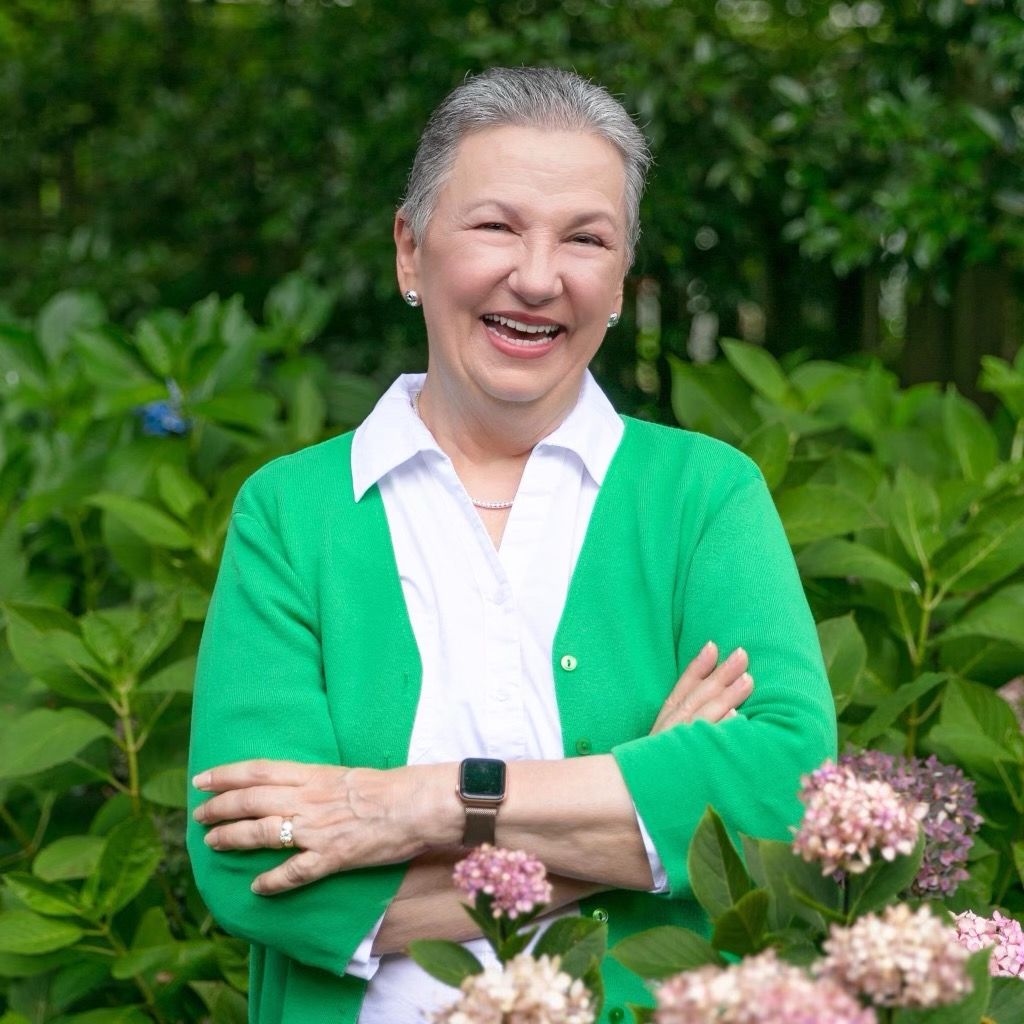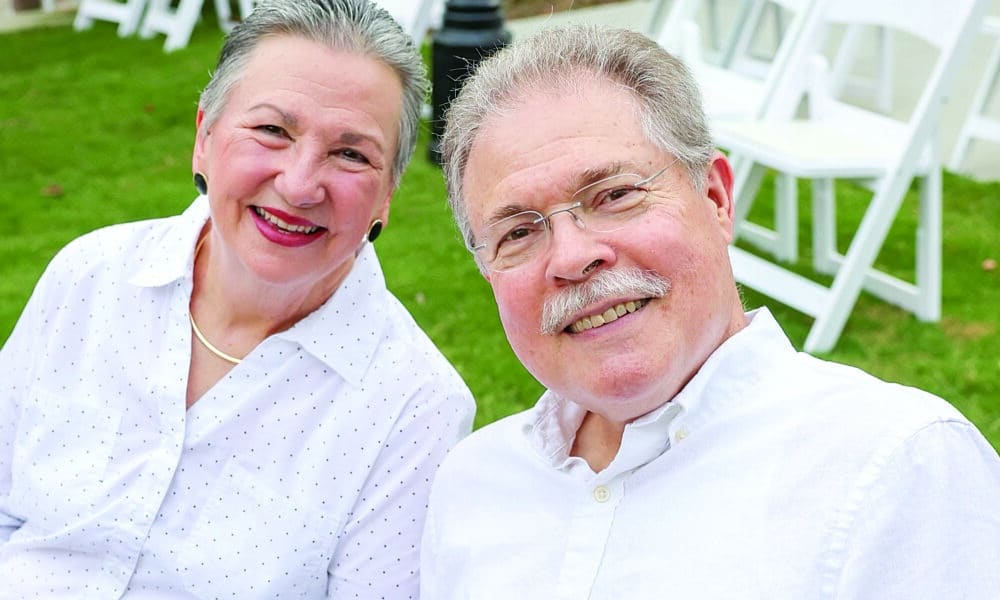Community
Good Grief: Life After Loss
Published
12 months agoon
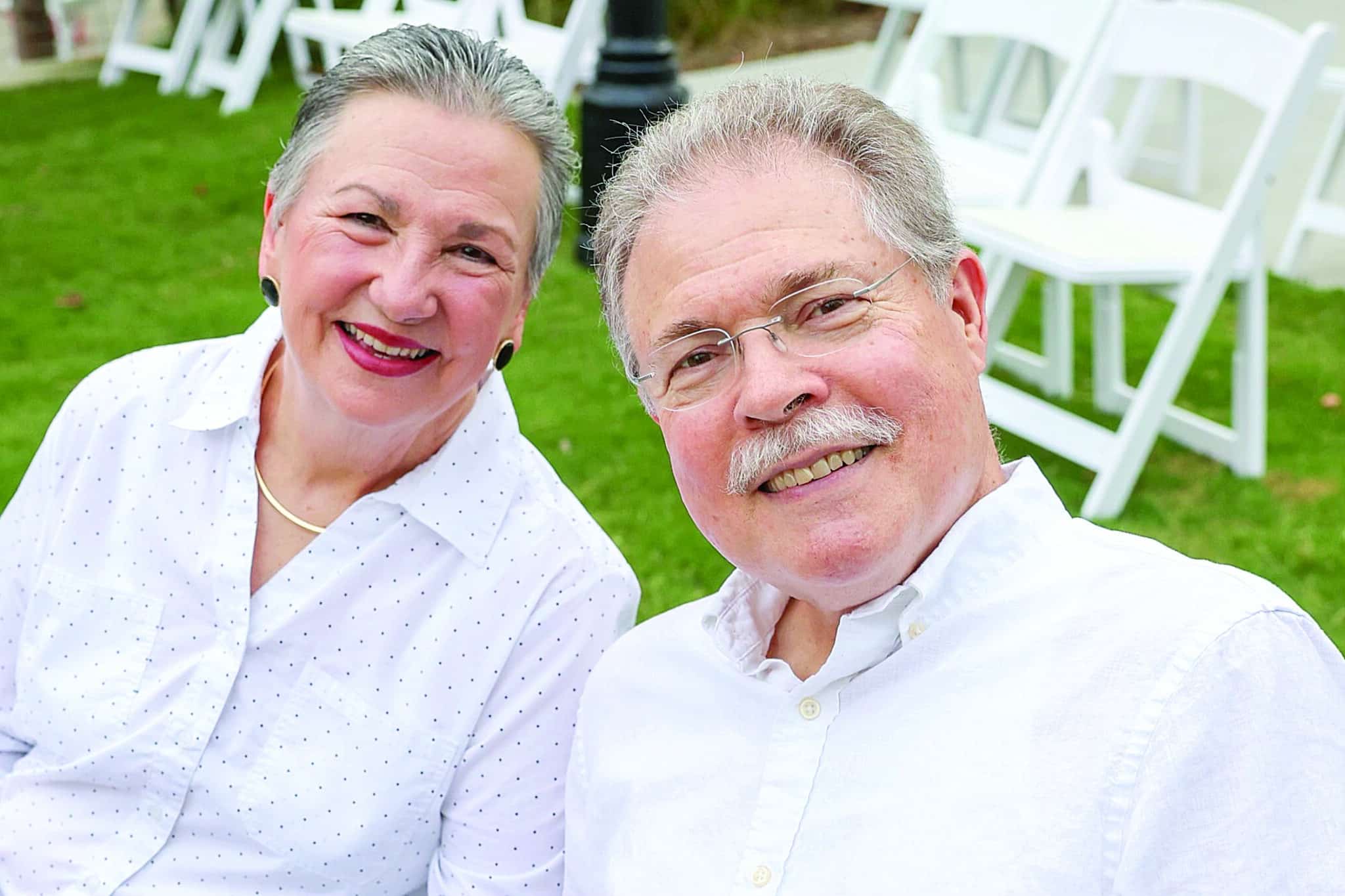
Part 1 of 2
As weighty a topic as grief can be, I felt compelled to address it as we approach National Grief Awareness Day on August 30. I wanted to provide support to those who are weathering losses. Even when life delivers one of its most powerful blows, we can share in the certainty that we will regain our equilibrium.
Opening up a space to discuss bereavement has been cathartic for contributors sharing their stories and will be for those who read them. Talking about loss is healing, even as tears are choked back at times. For readers enduring their own losses, there is comfort in the simple reassurance that we’re not alone.
Grief is unavoidable; it’s part and parcel of the human condition, the inevitable equalizer across the board in the game of life. We’re all bound to experience the tragedy and melancholy of having lost loved ones and tasked with picking up the remaining pieces of our lives to continue our journey without them.
How we deal with grief depends in large part on our personality and the relationship we had with the deceased. Thus, the process is singular to each of us. There can be no one-size-fits-all type of guide.
Losing a spouse can leave one person feeling shattered while another may face the same loss without much incident. The loss of a parent can result in one sibling handling it more easily than another, although they’ve lost the same person.
Neither reaction is right or wrong. Grief is as individual as our fingerprints. No two people will move through it in the same way.
Consider this two-part article an invitation to give yourself grace while navigating the harrowing journey through loss. Provided no one is being harmed, it’s important to recognize first and foremost that all grief is “good grief.”
Get by with a little help from your friends – and a professional
When it comes to death, as prevalent as it is, we can all be pretty terrible at dealing with it, whether we’re experiencing the loss or trying to comfort someone else. Advice from a pro can go a long way when we don’t know the best things to say or do.
To that end, Danielle Edwards, MSW, LCSW, of Edwards Psychotherapy and Consulting LLC, a grief, trauma and domestic violence recovery therapist, was kind enough to share her expertise.
First and foremost, Edwards advises any bereaved individuals struggling with thoughts of suicide to call or text 988, the Suicide and Crisis Lifeline, or to go to the nearest ER.
“Denial, Anger, Bargaining, Depression, Acceptance — the stages of grief. I don’t use them. There’s this idea that you’re supposed to move through denial, anger and once you hit acceptance, you can tie it all up and put it on a shelf. But it’s not a linear process,” Edwards said.
She advises people that they should eliminate any expectation that they should be further along. “There’s nothing wrong with you, you’re not off track, your journey may be riddled with detours and U-turns. Expect a slew of other pit-stops along the way like remorse and relief, that can also be part of your experience,” she added.
Mayor of Peachtree Corners, Mike Mason
Toiling in the garden, Peachtree Corners Mayor Mike Mason paused to survey his work and asked aloud, although he’s alone, “Well honey, what do you think? How does that look?” Having lost his beloved wife of 49 years this past January to an aggressive form of uterine cancer, he is left to only hope the late first lady of the city, Debbie Mason, would approve.
Maintaining their beautiful garden is a labor of love and one way Mason honors his late wife. “We created a habitat in our backyard for birds, squirrels, pollinators and predators. From the sunroom, you can appreciate the color palette and shapes of the pots and flowers,” Mason said.
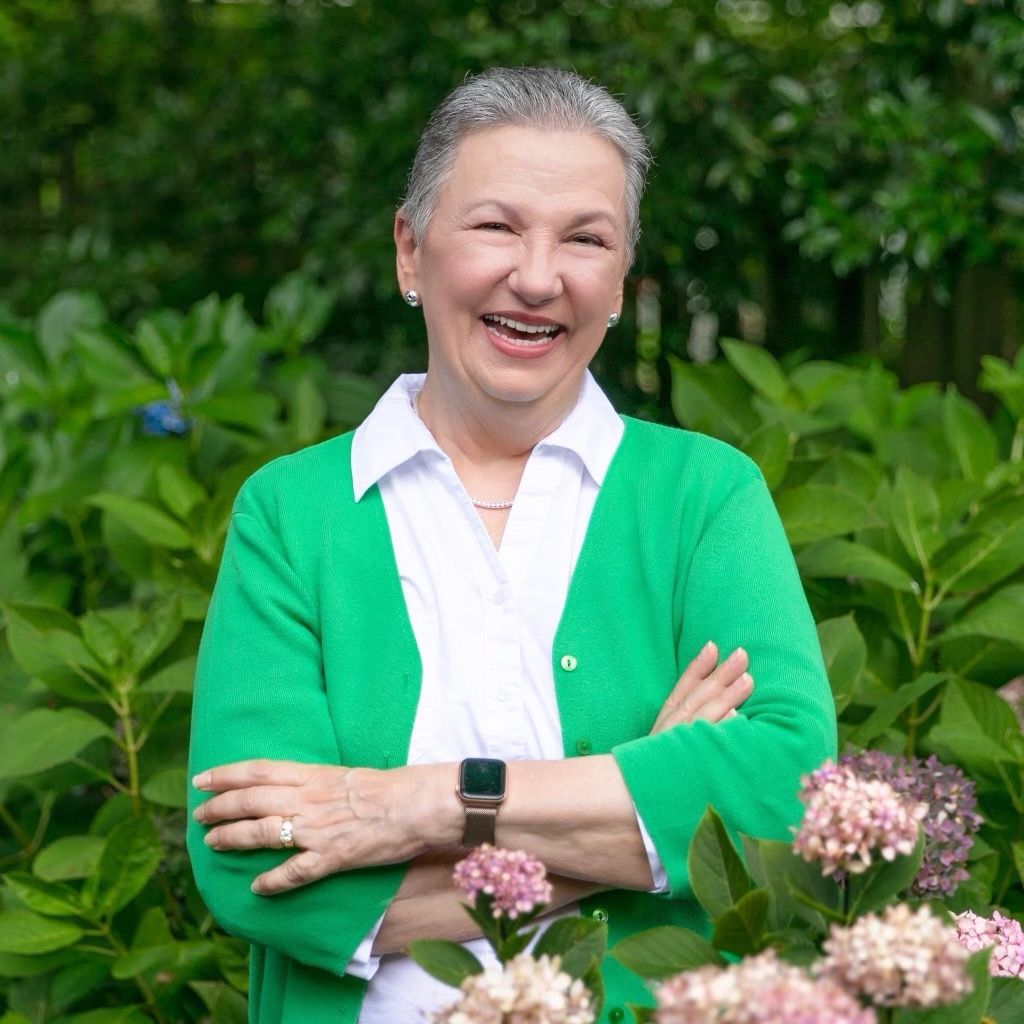
He recalls telling Debbie, who was always at the helm of their projects, that she was an artist, painting with landscape, hardscape and texture. She had responded, “I’m glad you see that.”
Grandiose memorial suggestions from well-meaning constituents, like naming the bridge or City Hall after Debbie, did not appeal to Mayor Mason. He doesn’t feel they’d accurately capture her essence. The City of Peachtree Corners will soon announce what is yet to blossom in the first lady’s memory.
In the meantime, Mason actively seeks healing through group counseling at the YMCA and reading books like Alan D. Wolfelt’s, “Healing a Spouse’s Grieving Heart.” He has graciously agreed to share some personal anecdotes in hopes of helping others.
Work through it
In moments when tears cannot be contained, Mason has learned to embrace the process of grieving. After gardening, you might find him tearfully sipping wine, reminiscing about how he and Debbie once delighted in that effort together.
Hearing a country western song while driving may require him to pull over. Listening to artists that Debbie loved from his vinyl collection, like Linda Ronstadt, cues the waterworks.
YMCA Grief counselor, Elli Garrett, sagely advised him, “You can’t stop listening to the music you love. You’ve got to work through the grief, keep experiencing life the way you and your partner did. Right now, those thoughts make you cry, but eventually listening to those songs will make you feel better because they remind you of her. You have to work through the grief to get to that point.”
Attempting to recover from the jolt of facing life devoid of the emotional intimacy he once enjoyed with his best friend, Mason repeats the mantra, “work through it,” as he continues.
“Move on means you’re trying to leave something behind. That’s the wrong approach. You have to continue. Ask yourself,‘What’s next?’ and plan it,” Mason said.
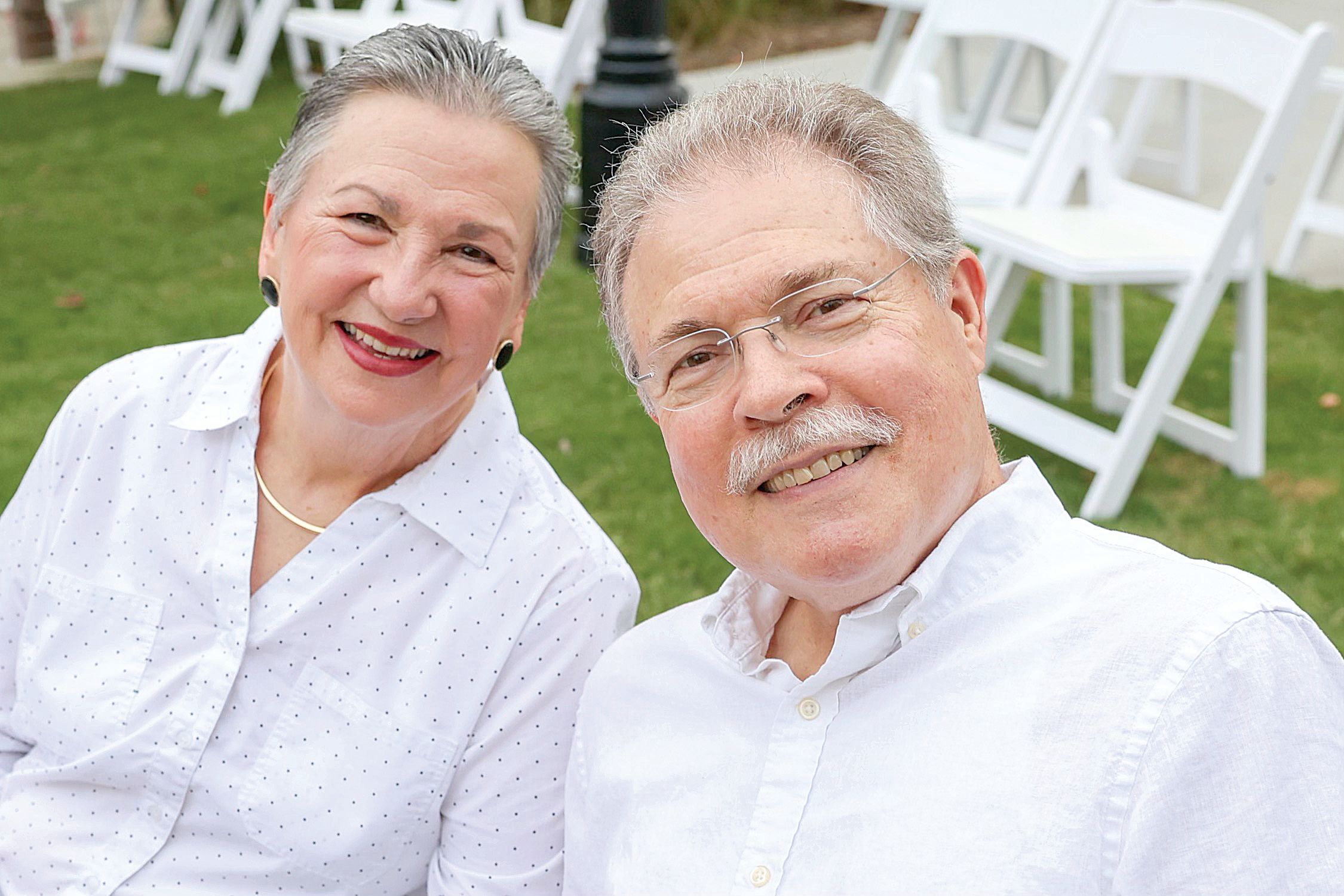
Mission impossible
Though wanting desperately to change Debbie’s circumstances, her illness was complicated by side effects and a stroke. Based on his research, the plan was to get her into remission and have five more years of seeing her smile, holding hands, flirting, snuggling and the daily tête-à-têtes with the partner he had built a life with as they worked together to create the City of Peachtree Corners.
“Nobody’s kidding themselves. There wouldn’t be a city without Debbie Mason,” he stated.
He had remained laser focused on being a cheerleader and would’ve done so forever if it would keep her alive. But two years after her diagnosis, Debbie was gone, leaving Mason to feel like he had somehow failed.
“My mission was gone. That’s a loss, too. Taking care of her didn’t work. Now I have to do what she told me several times towards the end: start thinking of the future,” he recounted.
Unable to think of life beyond Debbie until there was no choice, Mason abruptly met with solitude. “You wake up after the funeral, after everybody has gone back to their homes, and it’s just you and the house. All of a sudden, the house is quiet, the bed is empty,” he shared.
Facing the new normal is physically and emotionally exerting. As Edwards informed me, there’s no white knuckling someone’s passing, it doesn’t go away.
“Make room for the grief. Tend to it,” she said. And the mayor is doing just that.
Late night visits from the past
For Mason, the most difficult part of grieving has been the sleepless nights.
“Grief is insomnia,” he said. “Your mind won’t stop. You can be very sleepy, lay down and then, all of a sudden, you wake up and it’s that never-ending woulda, shoulda, coulda. It doesn’t matter that you intellectually understand [you shouldn’t do this]. You have to reason with yourself at two in the morning.”
Tormented by things he wishes he had done differently, Mason reviews past incidents. “People change. You’re not the same person now as you were when you first married. That’s where my mind goes — how I would’ve handled things as the man I am now,” he said.
Recognizing one should only learn from the past — it’s futile to beat yourself up about it — he endeavors to focus on today and tomorrow. “You can’t change it. Forgive yourself. Don’t make those mistakes again. Relentlessly remind yourself of that,” he said.
On a lighter note, one that couples can appreciate, the mayor realizes that if Debbie were aware of what he’s wracking his brain over today, she’d probably laugh and remind him of incidents he hasn’t even thought of yet.
Being a caregiver will change you
The difficulty of providing the most intimate care while watching a loved one as they’re ravaged by an unstoppable disease leaves a mark. Supporting the emotional and physical needs of a spouse at their most vulnerable, as they become forcibly dependent due to sickness and approaching death, imposes a disarming honesty and frankness.
“You will not be the same person. I don’t have much of a filter anymore. It’s not normal for a politician,” Mason said.
Forced to slow down while providing end of life care, the mayor has also noticed a change in his formerly fast-paced, herky-jerky ways. Now he adopts more of an unhurried disposition.
According to Edwards, some may wish to return to the person they were before the loss. But loss becomes part of your journey, and it does change you. The only question should be, “What does moving forward look like?”
“I love you in spite of, not especially because.”
It’s a family saying, or “Debbieism,” used in times of disagreement when the late first lady reprimanded their sons about things she may not have approved of. “‘I love you in spite of, not especially because.’ The three of us were outmatched by her,” the mayor reminisced.
Masons’ sons had markedly different reactions to the loss of their mother, in keeping with their own temperaments and individual bonds with her.
The eldest, Matt, spoke to Debbie before she passed and came out saying, “We’re OK.” He had become skilled at speaking to his mother in his best “help desk voice” whether assisting her with technology or resolving any differences.
Nick, however, had a more confrontational approach growing up. “He and Debbie could really push each other’s buttons,” Mason shared. Cancer didn’t leave much time for reconciliation. Though Nick is content with how things concluded, any residual burdens will be discussed with a therapist.
We’ve been friends through rain or shine for such a long, long time – Gordon Lightfoot
Remembering how Debbie left this world provides some comfort. “It ended well,” the mayor said. He stopped everything for two and a half years to focus first on saving her, and then on taking care of her.
“She knew I loved her, and it ended that way,” Mason said. He had given her a dose of morphine for the pain and helped her to relax with her favorite, a soothing foot rub.
“I touched her as gently as I could and said, ‘There you are sweetie, a good foot rub. Nothing like that to make a girl take a nap.’ She took a deep breath and let out a long sigh. That’s how she passed. It was a moment of love,” he said. “You do the best you can for as long as you can and then you continue.”
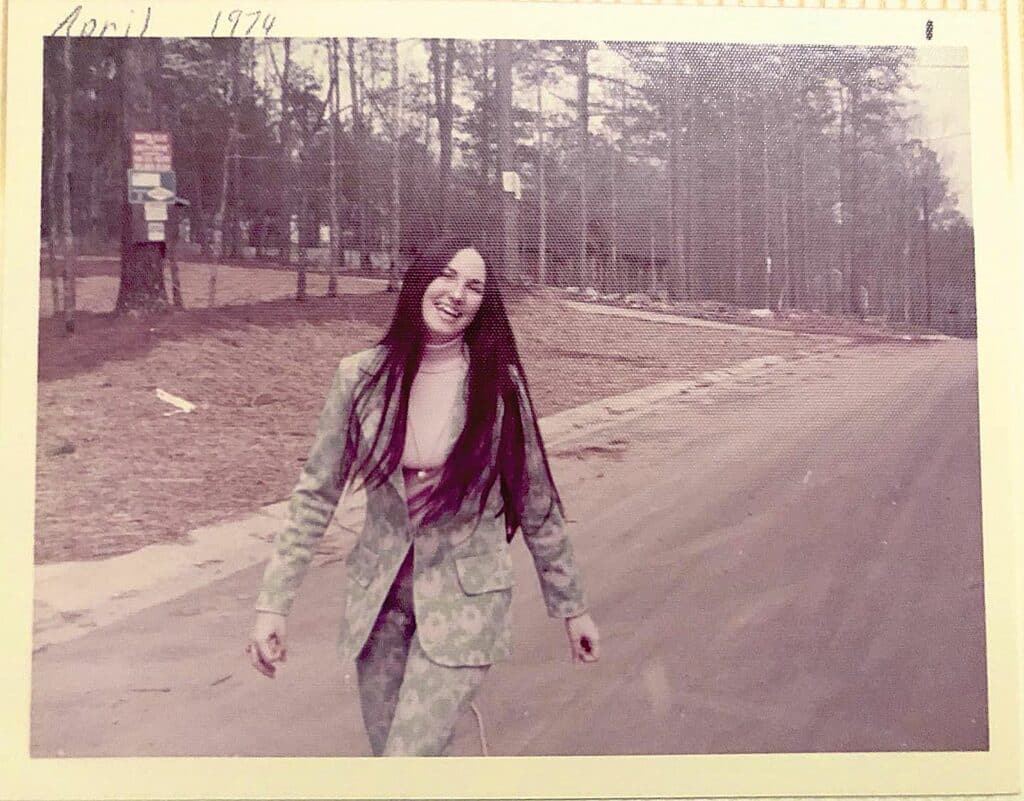
The Mason jar gets bigger
Edwards shared an uplifting visual. Picture a series of three Mason jars, each with a black ball of grief inside. The grief appears to get smaller from left to right, but in truth, it is the Mason jars that are getting progressively larger.
“People think grief will get smaller and smaller. But we grow around our grief. The jars get larger. Grief remains; we change and grow around it,” Edwards said.
Physical separation is difficult but personal growth still occurs after losing someone we love. There will be enjoyment again.
Edwards suggests releasing any guilt you may feel for having joyful moments because the deceased can’t share them with you. Embrace new people and new challenges. Do the things you’ve always enjoyed.
Developing new social contacts and having new experiences is allowing for Mason to slowly grow around his grief, like the Mason jar imagery.
He found this message communicated to him by Pastor Lori Osborn at Mount Carmel Church, to be most helpful. “The reason why, right now, talking to your friends is so hurtful, your grief is so profound, is that you live in a world where all your friends knew Debbie. Keep meeting new people so the size of your group of friends expands to include people who didn’t know her — you won’t leave them crying. Don’t be afraid to do new things,” Mason recounted.
When asked for any advice he’d like to share with mourners, he replied, “Get up every morning and try to do just that, but be kind to yourself. If you had planned to do something and suddenly you don’t want to, change the plan. Do the stuff you loved before.”
As for the mayor, he’s benefitted from a return to listening to music, perusing bookstores and reading. He is determined to keep his set point at happy and positive. It’s no easy task for the man who had tissues at the ready when he teared up during our interview.
“You get a little battered, bruised, but have to stand up and regain your balance. You can’t be a good partner if you’re too dependent upon the other person, but you do connect and lean on each other,” he said.
Feeling esteem for our city leader who so dearly loved his wife, it is my most sincere wish that when he’s ready, Mayor Mason will find a new partner with whom to create traditions and make memories, just as his departed wife had wished for him.
Caroline Manning
Caroline Manning lost her husband of 42 years in 2018. Thoroughly entrenched in the community, when he wasn’t at his law firm, John coached baseball and played tennis. He was the first Chairman of the Board at the Robert Fowler YMCA where he served on multiple committees thereafter.
He also hosted the Good Friday breakfast for thousands of people and delivered sermons to the children at Simpsonwood United Methodist Church every Sunday for 30 years. Needless to say, John was a busy man.
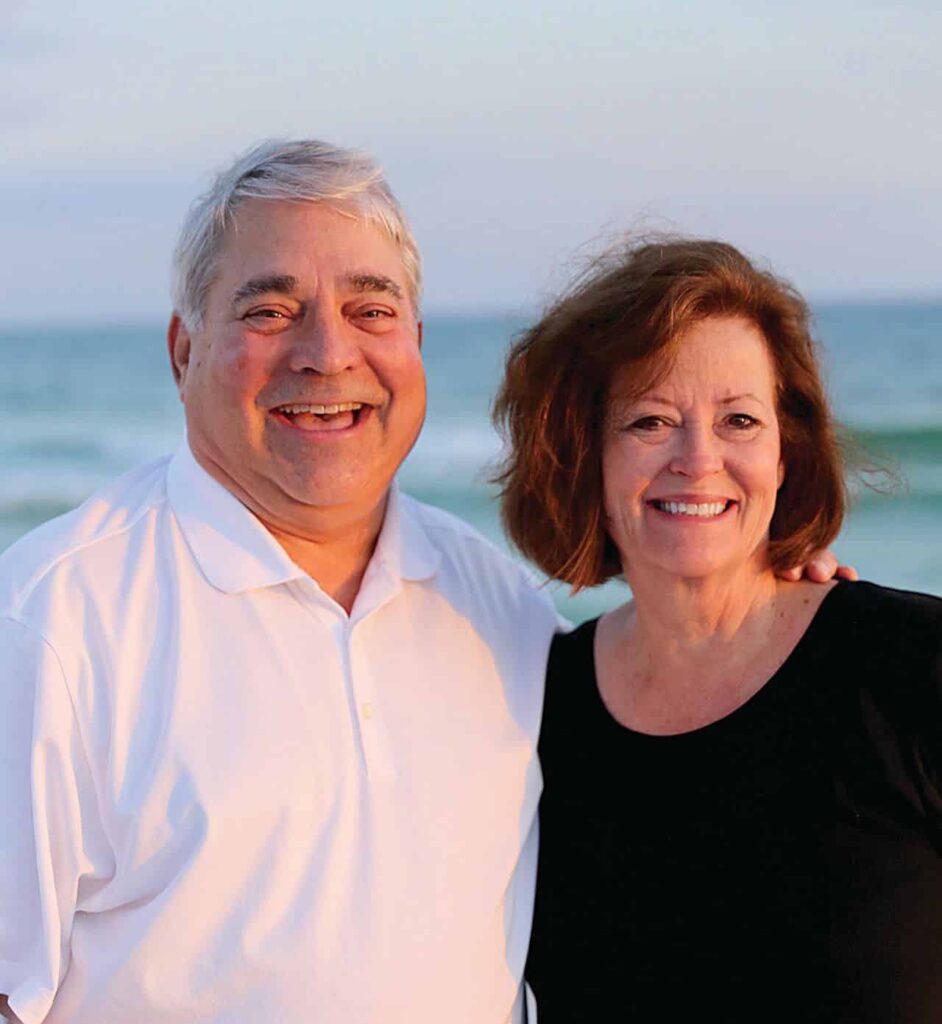
He died as he lived, assisting others. He was having fun with dear friends while helping a parishioner who had been evicted. They were boxing and transporting her belongings to an apartment on a hot September day. John, who had lived with Type 2 diabetes for 25 years, was seen jovially directing traffic. No one noticed he was declining.
In addition to taking insulin to keep blood sugar levels steady, diabetics must also remain vigilant and eat at certain times. Thinking he’d be home by noon, John had overextended himself in the warm weather, likely fueled only by a donut breakfast with his church group.
Probably feeling shaky by 2:00 in the afternoon as his blood sugar plummeted, he announced he was going to get something to eat.
“He was too busy to pay attention. He knew how to deal with it but would get so wrapped up in whatever project he was involved in. I would say, ‘John, you’re a grown man. If you feel bad, you need to stop and get something to eat.’ This was before FreeStyle Libre that checks your blood sugar and keeps you posted,” Caroline said.
At home preparing to receive guests, Caroline was contacted by a Duluth policeman with news that John had gone to Burger King, choked and passed out. Someone performed the Heimlich maneuver and John was rushed to Joan Glancy Memorial Hospital.
She was told to get to the hospital immediately.
The unexpected
Upon arrival, the receptionist sent her to a room. When a grief counselor introduced herself, Caroline thought she must have the wrong person.
Then the doctor came in and abruptly delivered the message, “I’m sorry to tell you this, Mrs. Manning, but your husband has passed away.” The choking had caused a heart attack. John was 70.
Caroline alerted the church that John wouldn’t be giving the Sunday sermon. She and her daughter Catherine fielded a barrage of questions as doctors sought to determine the cause of death. Her eldest, Sarah Frances, rushed home from Hilton Head.
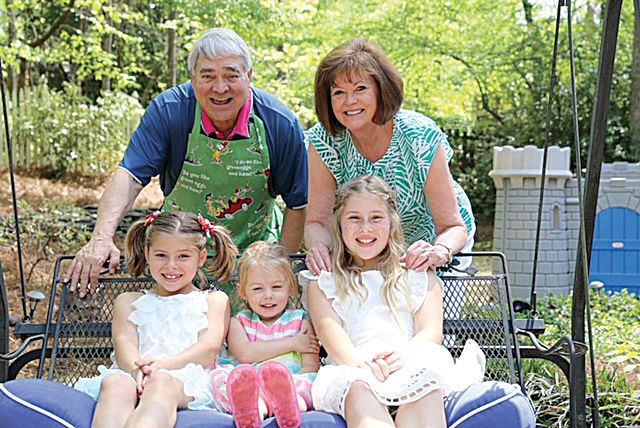
Anticipatory grief
Edwards explained anticipatory grief. If you can see it coming, whether it’s a terminal illness, an addiction, a loved one’s behavior that could cause their demise, grieving begins while the person is still alive.
“When you fear you’re losing this person, in the back of your mind you know unless something changes, this is likely going to end in their death, you’re already grieving,” Edwards said.
Those suffering anticipatory grief may wonder why they’re not more sorrowful once the individual passes away. “I ask clients to tell me about before. Before was full of so much grief or worry. Afterwards, it’s almost like a sigh of relief. Grief is more than sadness,” Edwards said.
After the initial shock, Caroline experienced a sense of calm. It was the end of her distress every time John left the house. She no longer had to worry about him living on the edge. It may seem unusual to those unfamiliar with this phenomenon, but it is indeed, part of grief.
She and her daughters had witnessed more of John’s risky behavior and cautioned him repeatedly.
Wishing he’d had FreeStyle Libre to beep at him, Caroline shared, “We worried constantly. He’d stay too long at the office or go to a meeting and not eat. By the time he’d get home, he’d be shaking and sweating. We’d get mad.”
Fearing the worst, Caroline insisted on moving his office from Buckhead back to Peachtree Corners; John was having episodes of feeling light-headed driving home.
She had asked him, just months before he passed, what his wishes would be for his funeral. She knew he’d have specific requests for songs and Bible verses, and she noted those.
Losing a patriarch
John’s departure was swift. “Because we didn’t see any suffering, what we had to do is learn to live without him,” Caroline said.
She was at ease assuming the role of hostess. “People were coming over. I was explaining what had happened and making everyone feel comfortable,” she said.
Sarah Frances, who worked in public relations at the time, kicked into PR mode. She wrote the obituary, planned the funeral, created the program and contacted everyone. She was in full-blown funeral mode.
“That’s how Sara Frances handled her grief. She wanted it to be the most perfect funeral, if there is such a thing,” Caroline said.
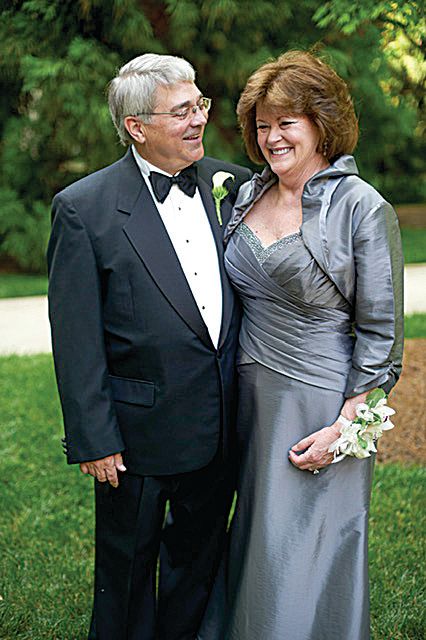
Diabetes can kill you
Stressing the seriousness of diabetes — a disease that can unexpectedly kill you — Sarah Frances also contributed to a cautionary article for a legal publication. The response was surprising. Caroline heard from several attorneys with Type 2 diabetes who never thought they could die from it.
The family was stunned by comments like, “I’d just get a Coke and a candy bar to bring my blood sugar levels up,” Caroline said.
Wives reached out declaring they had never fretted, having no idea this could happen. “I don’t know what doctors are doing wrong. People think they can eat and do whatever they want, as long as they’re taking meds. So much to learn,” Caroline sighed.
Count your blessings
John’s doctor provided some consolation, pointing out that he could’ve gone into a coma. “I firmly believe God took him quickly as opposed to letting him stay in a coma. He would not have liked to have a debilitating disease. He died the way he would’ve wanted — doing what he loved with people he loved — and not in bed, sick,” Caroline said.
“He was never sick. He never missed church or work. I think we’d all hope to die like that — quickly, no suffering, no putting your family through struggles. I count that as a blessing,” she added.
No time for a meltdown
Fraught with projects, there was no time to stop. It was likely self-preservation that had her functioning on autopilot. “I didn’t have a real meltdown,” Caroline said.
She’d been suggesting they downsize and encouraging John to either close his office or work from home for years. Not wanting the task of maintaining their family home alone, Caroline was quick to get it on the market.
She also closed down John’s law firm. It was a daunting undertaking; he had practiced for over 40 years.
Just days prior to his passing away, the couple had started cleaning out their basement — a job she was left to complete on her own.
Same loss, different grief
“I had all those projects lined up. I was consumed with all that. I think the girls have struggled more than I have. They were both very close to their dad,” Caroline said.
Each of the Mannings’ daughters would tell you they were John’s favorite. Sarah Frances, who inherited John’s exuberant personality, sought grief counseling.
Advice
Selecting Crowell Brothers Funeral Home on Peachtree Industrial Boulevard proved to be beneficial. “They were wonderful to work with. They handled everything,” Caroline said.
They fought for three months to obtain the certificate of death without which one cannot sell property or collect life insurance. They remained in constant contact with Caroline, who deems them “fabulous.”
According to Caroline, grief must be processed one step at a time. She has moved from one step to the next with the help of her girls and her grand-girls, who are a huge part of her life.
Decisions, decisions
The hardest thing for Caroline was facing choices alone. She was glad to have the support of her daughters.
“When you’ve been married for 42 years, the hardest thing is making a decision by myself,” Caroline revealed.
Without an equal partner to help weigh ideas, she realized that whatever happened going forward, was going to be her call. It was daunting at first, but now she’s more comfortable with it.
“I’m loving being in charge,” she chuckled.
The company of a man
When Caroline and John were together, the couple enjoyed mutual respect and a lot of fun. They loved cooking and entertaining, music and theatre.
Caroline misses his humor, companionship and the fun surprises he’d plan, like scavenger hunts and progressive dinners spanning multiple restaurants.
“John liked to go and do,” Caroline smiled. “Not having any men in my life has been challenging. They do bring a lot. I’m only now reaching that point.”
New life
“I feel like I am where I’m supposed to be,” Caroline shared.
She’s moved to a home she loves in a conveniently located neighborhood of both young families and empty nesters. “It’s a nice mix. A great group of people. The women get together for happy hour at the pool,” she said.
Embracing a new career, Caroline adores substitute teaching at her granddaughters’ school. They bring their friends by to meet their “Mimi.”
Caroline is ready for the next chapter in her life.
Bottom line
Tomorrow is not promised to anyone. Tell your people how much you love them often and treasure the special moments you are able to share with them.
Part 2 of Life After Loss is scheduled to appear in the next issue of Peachtree Corners Magazine.
For a therapist who will meet you wherever you are on your grief journey, contact Edwards at 470-668-5930 or email info@edwardspac.com.
Related
-
-
-
-
-
John and Caroline Manning
-
John and Caroline Manning with their grandchildren
-
John and Caroline Manning enjoying a special occasion together
-
Debbie and Mike Mason
Patrizia hails from Toronto, Canada where she earned an Honors B.A. in French and Italian studies at York University, and a B.Ed. at the University of Toronto. This trilingual former French teacher has called Georgia home since 1998. She and her family have enjoyed living, working and playing in Peachtree Corners since 2013.

Community
Peachtree Corners Shines Bright with Light Up the Corners Glow Race this August
Published
2 days agoon
July 24, 2024
Peachtree Corners’ annual Light Up the Corners Twilight Trot and Glow Race is returning to the Forum on Aug. 10 for its 13th year of building community, getting some exercise and benefitting a very worthy cause.
Amy Massey, the founder of Light Up the Corners, said her inspiration for the nonprofit came from serving on the board of the Fowler YMCA for 10 years.
“I was always looking for ways to raise money for [Fowler YMCA’s] annual campaign. And I rotated off about 12 years ago or 13 years ago. At that time, I was looking for ways to raise money, and the City of Peachtree Corners was talking about becoming a city through UPCCA,” she explained.
“I’m a runner and I was a member of the Y, and we had a running group out of the Y. So, I just recruited some of my running friends and decided we would start a race in Peachtree Corners,” Massey added.

Bigger and better
In its first year, the race had roughly 400 participants. Not a bad turnout for the inaugural event, but Massey and her team of volunteers quickly started brainstorming on how to attract more runners.
“We talked about doing a glow run, and that’s when it changed. So, in year two, we did our first glow run. This year will be our 11th annual glow run and our 12th run altogether. And then we took one year off during COVID,” said Massey.
It’s my baby,” she added. “But I could not do it without the help of my friends and running partners who have been with me all the way. We have some of the same volunteers on our committee now as we did when we started out.”
This year, Light Up the Corners expects over 1,500 attendees.
“There are a lot of glow runs out there that are more of adult-focused parties. But ours truly is a coming together of people of all ages and all walks of life,” said Massey.
“That’s what sets us apart because our largest demographic in terms of age groups is the 10 to 19 range. A lot of school-age kids come out, a lot of young kids with their parents. We have 300 little kids who sign up for the Twilight Trot, which is just half a mile long. And so that attracts the little ones. It’s heartwarming to see people of all ages come together and it’s a healthy fitness-focused, family-friendly community activity,” she added.
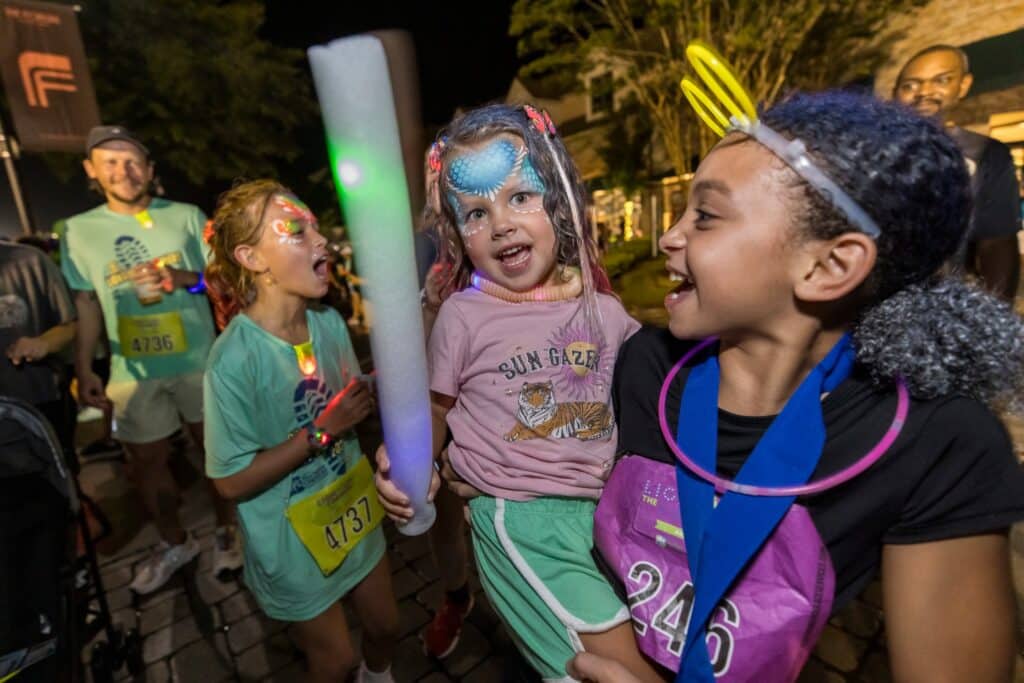
A big, family-friendly party
In addition to two races: a Twilight Trot 1K for the kids, and a 4-mile Glow Race for the adults, the Forum will be showcasing its new plazas. The pre-party and Glow after party will be held on the Grand Plaza which is set to open on that very weekend.
“Each participant gets a lot of glow swag, we want to make sure everybody lights up the course as they’re running around Peachtree Corners, and also to keep them safe so everyone gets that and a glow baton,” explained Massey.
“We welcome runners, walkers and people of all ages. It is more about the fun and the excitement of coming together as a community than it is about racing or setting any speed records,” she added.
The Forum has also hired Yvonne Monet, a radio personality and DJ with Q99.7, to entertain eventgoers and keep the energy up with great music. There will also be face painting and neon fingernail painting, along with roaming entertainers on roller skates and more, courtesy of the Forum.
On top of that, race sponsors will be providing food and samples throughout the night, like pizza, watermelon and a wide variety of other tastings from The Forum restaurants.

Coming together for a worthwhile cause
Light Up the Corners is an IRS-recognized 501(c)(3) nonprofit run entirely by volunteers. There are no paid positions at all, and 100% of proceeds go to the Why it Matters Campaign at the Fowler Y.
“All money stays local, and it is a passion of our committee to help the Y through this campaign. We believe that all people, regardless of their ability to pay, deserve to benefit from the programs and services at the YMCA. And they have a sliding scale that they use to provide financial assistance to people,” said Massey.
“There’s a wide range of programs and services, and I’ve seen firsthand the work that they do there and the life-changing effects that it has had on so many people in our community,” she added.
Sponsors are also fundamental to the event’s success.

Without the support of sponsorships and generous donations, there would likely not even be a race because the associated costs would cancel out the registration fees, explained Massey. Sponsors allow Light Up the Corners to offset all costs of the event so that 100% of registration fees by individuals go directly to the YMCA.
“I will say that North American Properties, when acquired The Forum, have gotten behind this event 110%. They have been amazing in their support and generosity in providing the tents, the entertainment and the backbreaking work of setting up something like this,” said Massey. “We couldn’t do it without them or the City of Peachtree Corners which has been a title sponsor since day one.”
Fun fact: For the first time, Light Up the Corners held an open competition to see who in the community could design the best t-shirt logo for this year’s race. Daniel Lee was chosen out of over 30 submissions and was awarded $1,000 for his efforts.
To participate in the annual Light Up the Corners Glow Run, register at lightupthecorners.com or simply line up on the racecourse and cheer the runners on as a spectator. To become one of over 200 volunteers, email Amy Massey at amassey@runthecorners.com.
Related
Community
Twin Authors Chronicle Antics of ‘Four-Legged Brother’
Published
2 months agoon
June 6, 2024
Berkeley Lake second graders make fans across the globe with sweet children’s story.
When rescue dog Apollo found his forever home with Megan and Mackenzie Grant, the Berkeley Lake twins knew they had added a special member to the family. He’s so beloved that he’s considered their “four-legged brother.”
Apollo is a Boston terrier. The breed is known for its friendliness and love of people and children. According to the Purina Company, makers of all kinds of pet food, Boston terriers make affectionate pets and are outgoing and social.
While they are called ‘terriers,’ they are not in the terrier group, nor do they behave like them. They are far happier at home with their owner than getting into the usual mischief.
But Megan and Mackenzie see him as a silly addition to the family.
“He’s super cool because he’s always up for fun and loves us a whole bunch. And guess what? We love him back even more! He’s like the best friend ever, wagging his tail and making everything awesome!” they said in a press release.
Apollo’s birthday inspiration
As his first birthday approached, the girls, six years old at the time, wanted his day to be special.
“I said, ‘Well if you want to come up with something to do, let’s write it out,’” said mom Tameka Womack. “So they started writing out all these different adventures, and it was so cute.”
Megan recalled that their teacher had told them about someone who had published a book, and she asked if they could, too.
“When I read through it, they had all the different things, like playing dress up because we had bought some clothes for him. And we take them out for long walks around the lake and stuff,” Womack added.
Although their favorite subjects in school are PE and art, they did such a good job with the tale that Tameka worked with them to get it published. On Feb. 1, the young authors released the children’s book, “How We Love Our Four-Legged Brother.”
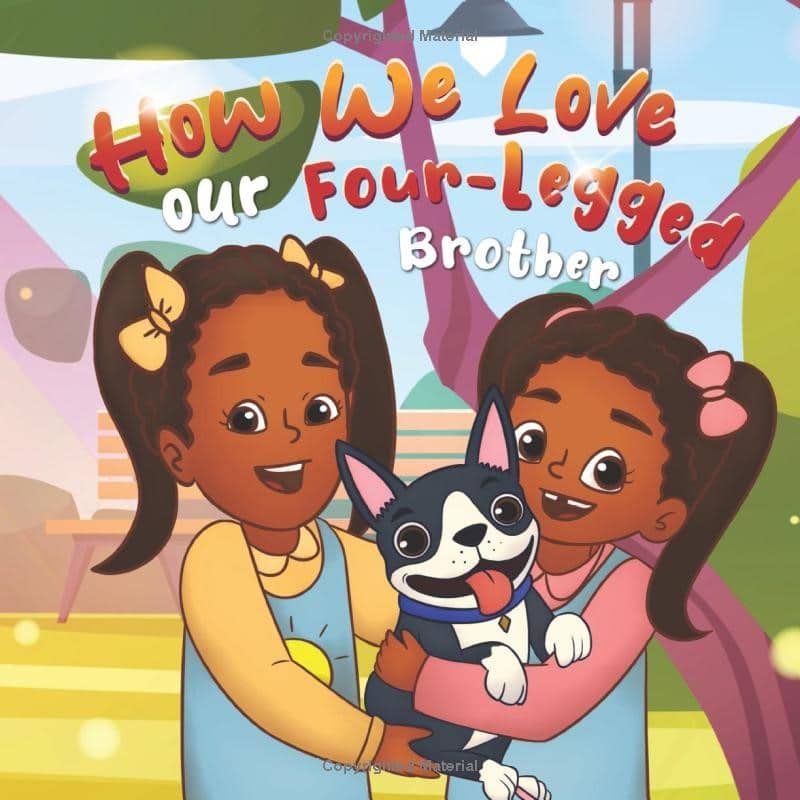
Publishing success
The 30-page book took off almost immediately. Available for print and digital through Amazon and print editions through Barnes & Noble, the book has reached customers in the U.K., Germany, France, Japan, Canada, Australia, Sweden, the Netherlands, Italy, Poland and throughout the U.S.
The girls and their mom were so pleased and surprised to find out the book was No. 1 in its category on Amazon.
“They were just so excited that people actually bought the book,” said Womack. “They were just like, ‘Wow, who is buying this?’”
Feedback from fellow twins, animal lovers and teachers showed that the story resonated on many levels.
“As an educator, I am always on the lookout for diverse and inclusive literature for my students. ‘How We Love Our Four-Legged Brother’ not only captivated the imaginations of the children in my class but also served as a wonderful conversation starter about friendship, empathy and the beauty of diversity,” wrote Ashleigh Darby.
The royalties from book sales are tucked away, with a percentage going to Apollo’s wardrobe.
“He won’t go out in the rain without his raincoat … or out in the winter without his sweater,” said Womack. “We have a little budget for his clothes because every time the girls see something, they’re like, ‘Oh, I think Apollo will like it.’ I’m like, I think he would too, but let’s let it stay in the store.”
Nurturing creativity
Although both mom and dad are engineers and kind of hoped that the twins would follow in their footsteps, Womack said she’s okay with them being artistic and creative.
“Writing is teaching them some responsibility and teaching them a little bit about money,” she said. “Now they want to write a book every day.”
Between raising three daughters (the twins have an older teenage sister), running a household with her husband and keeping up with her career at Georgia Tech, Womack said she’ll look for time to continue helping the girls with their dreams.
“With summer coming up, I would definitely encourage parents to help their children explore their creativity in any kind of way, from digging holes in the ground to … seeing the world … to creating books instead of being on the internet,” said Womack. I try to limit my kids’ screen time … and build real memories.”
Find “How We Love Our Four-Legged Brother” on Amazon.
Related
Community
Local State Reps Give Roundup of Legislative Session
Published
2 months agoon
May 28, 2024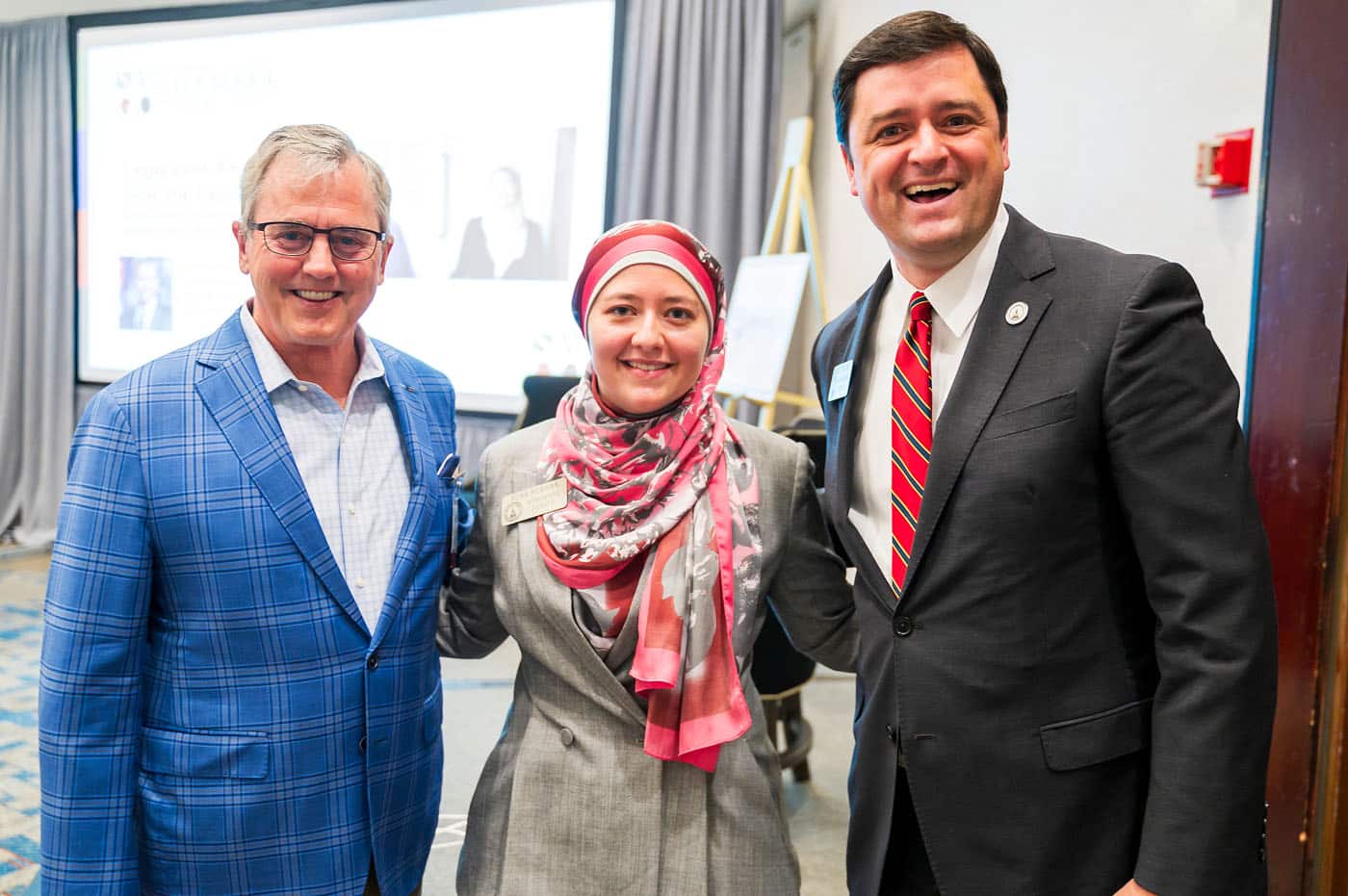
Hilton, Romman trade friendly banter that reflects diverse views in Georgia government
Georgia State House District 97 Representative Ruwa Romman and District 48 Representative Scott Hilton, whose constituents include parts of Southwest Gwinnett County, including Peachtree Corners, sat down for a second time to share information about legislative action at the State Capital.
Their discussion was part of the Southwest Gwinnett Chamber of Commerce First Friday Breakfast series at Atlanta Hilton Northeast.
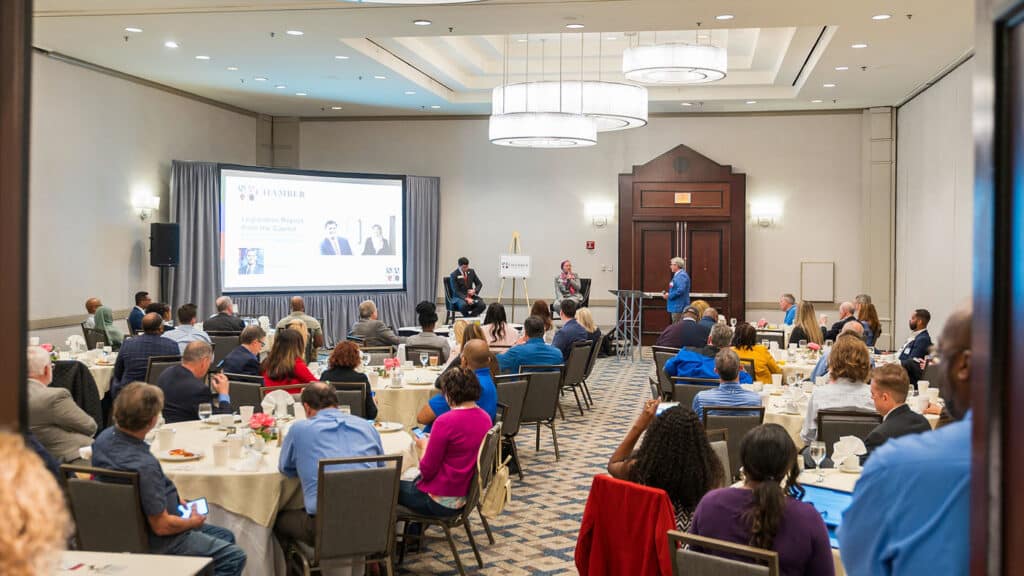
Although they sit on opposite sides of the aisle, Hilton and Romman both seek to sponsor and pass legislation that improves and maintains a high quality of life in the Peach State and provides its residents with what they need.
Elected in 2022, this was Romman’s sophomore year in the State House. She serves on the Georgia House Energy, Utilities and Telecommunications Committee, Georgia House Information and Audits Committee and Georgia House Interstate Cooperation Committee.
Hilton previously served in the State House from 2017 to 2019 but took a “sabbatical,” as he calls it, to serve as executive director for the Georgians First Commission under the Office of Governor Brian Kemp.
He was re-elected to his current position in 2022. He is the vice chair of the Georgia House Creative Arts and Entertainment Committee and the Georgia House Education Committee, as well as a member of the Georgia House Public Health Committee and the Committee on Georgia House Urban Affairs.
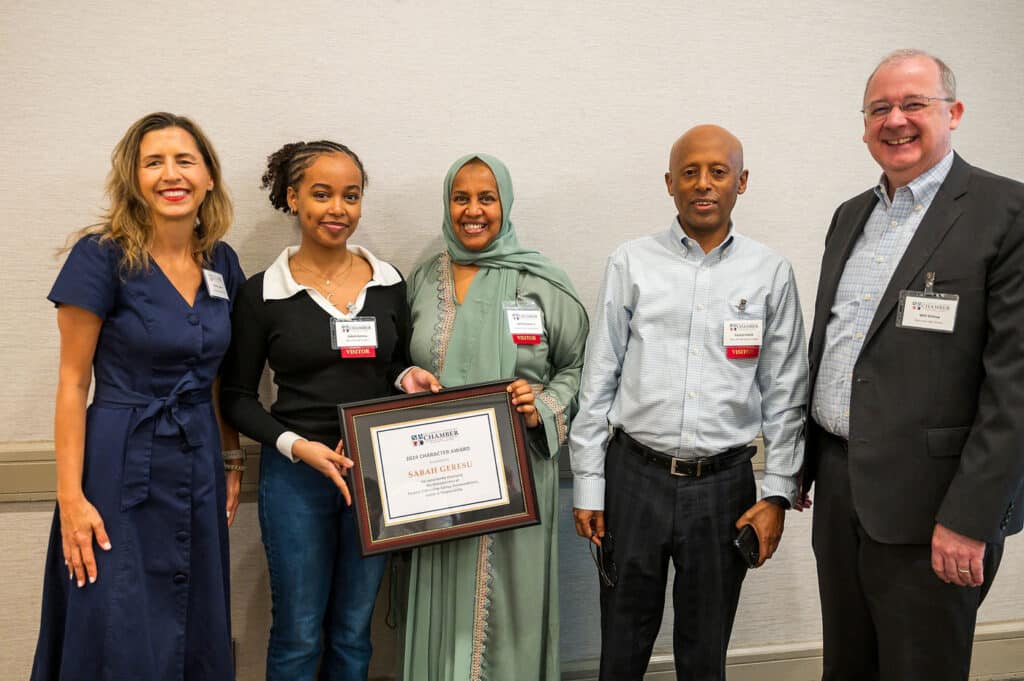
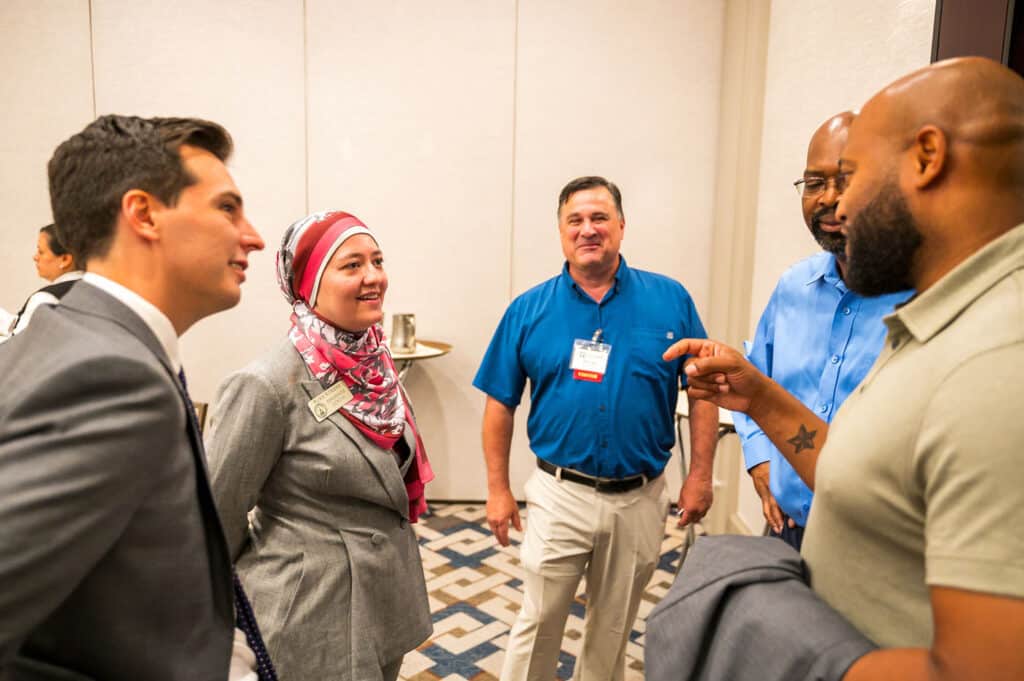
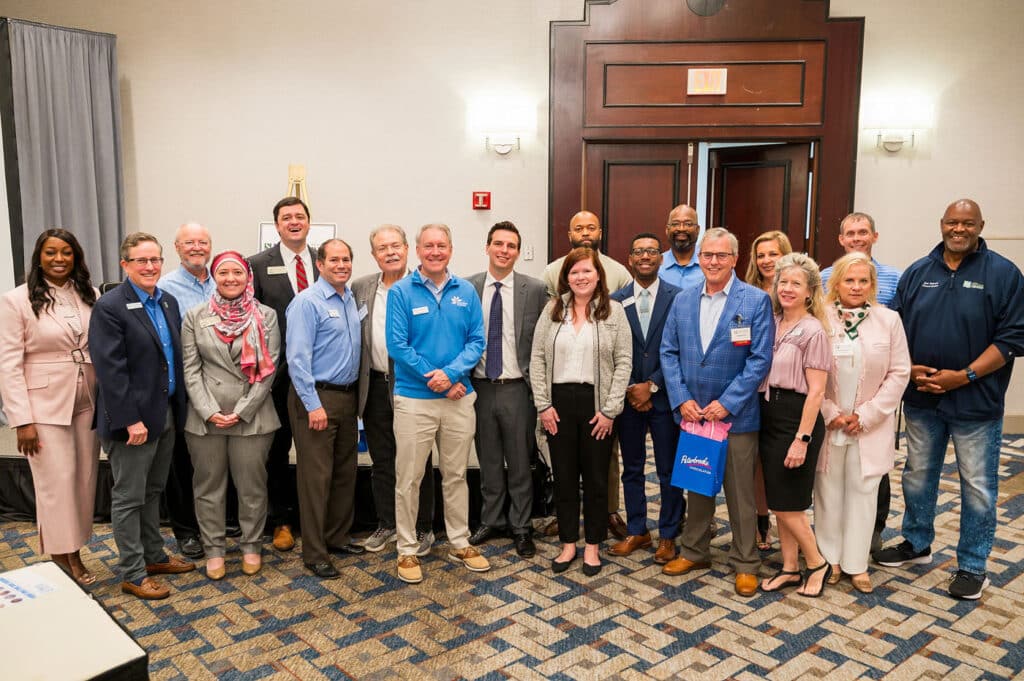
Senate Bill 63
The moderator, Norcross resident and former WAGA political reporter Dale Russell started off with a topic making headlines: Senate Bill 63. This law, signed by Gov. Kemp shortly after the session ended, prohibits charities, individuals or groups from providing bail funds for more than three people per year unless they register as bonding agencies. It also expands mandatory cash bail to 30 new offenses.
“I think it’s going to bring home safety to the community,” said Hilton. “I ran on that issue because as I was knocking on doors, I’ve heard from folks who [want to] keep our community safe. And unfortunately, no community has been immune from the uptick in crime that we had seen post-COVID, so this was one of those bills in response to that.”
Hilton gave examples of crimes where individuals out on bail committed acts such as murder.
“That was our commitment back to our constituents to say, ‘Listen, we’re not going to let bad guys back out onto the streets again to do more crime.’ This bill was in response to this; it’s going to keep our community safe, hold those accountable and bring justice to those who break the law,” Hilton remarked.
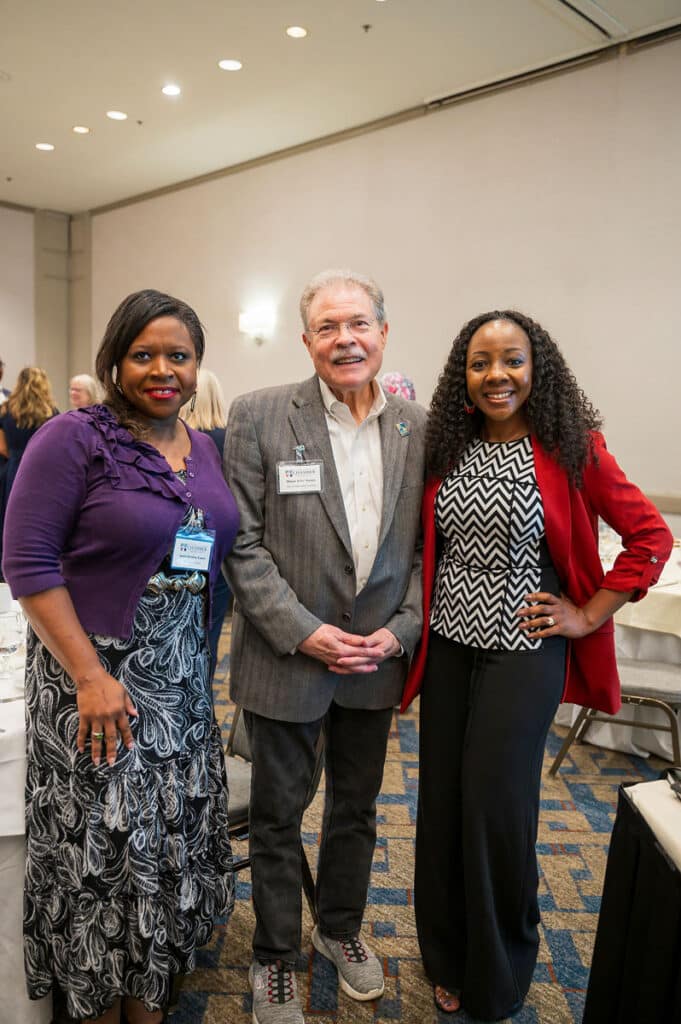
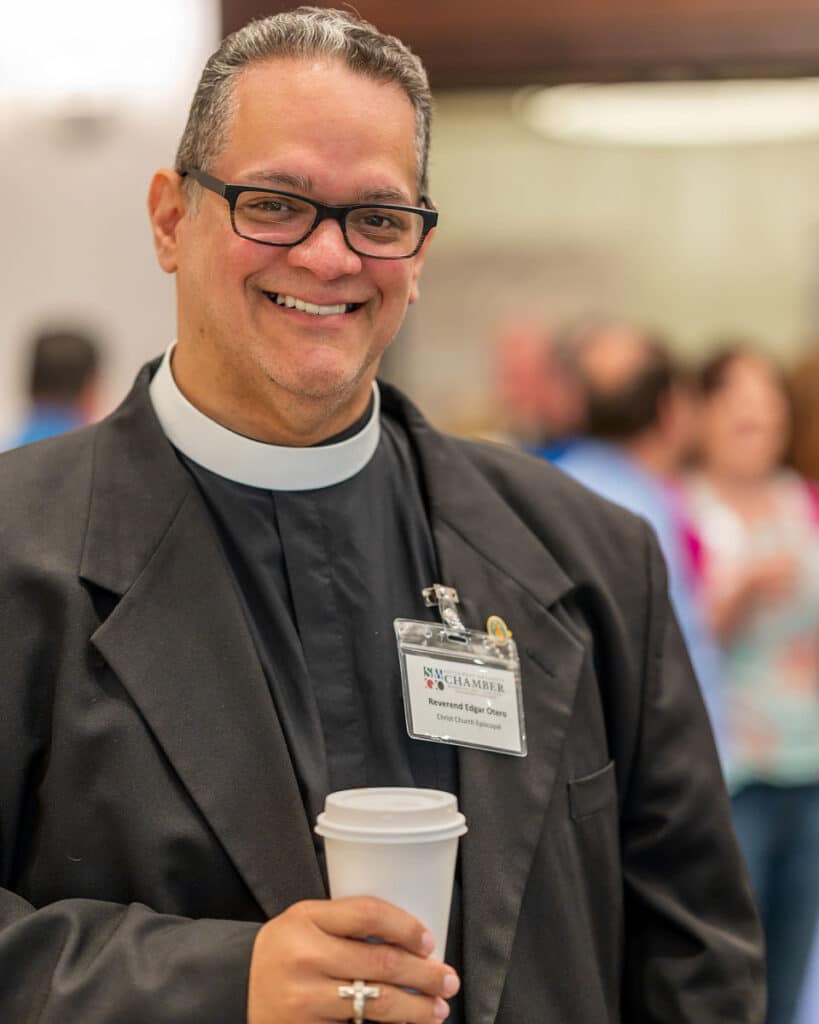
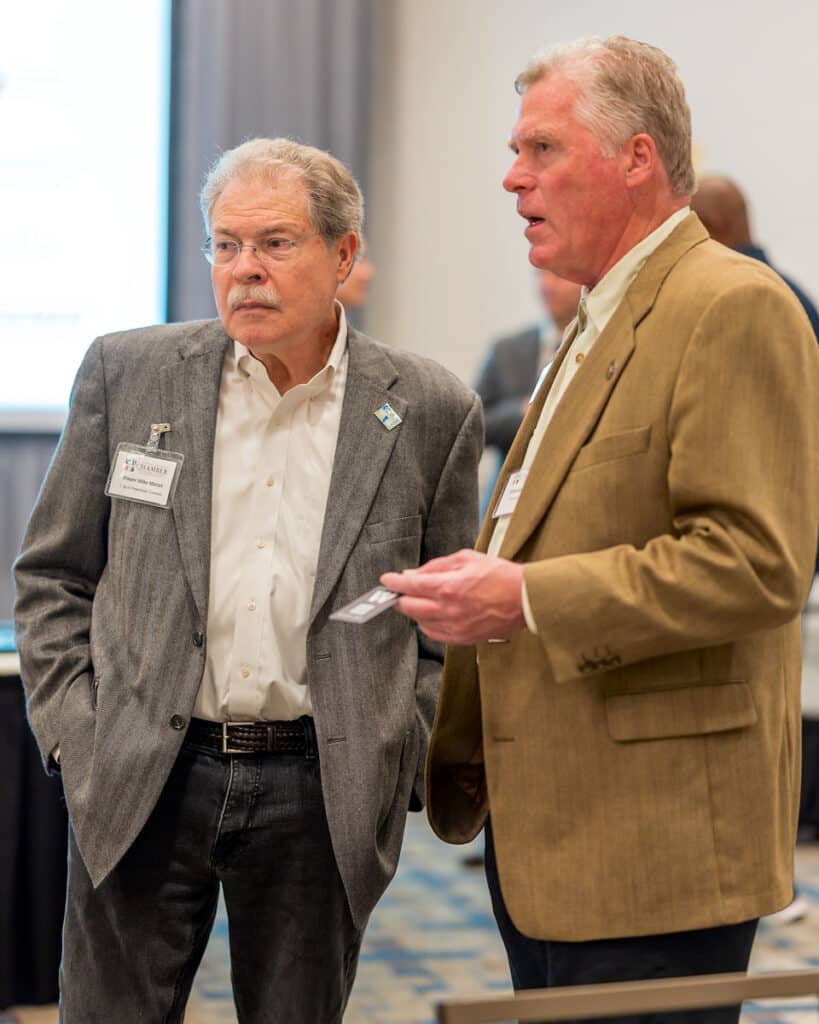
“Unfortunately, right now, we’ve got district attorneys and sheriffs across Georgia who are blatantly disregarding the law and letting folks back out on the streets who pose, you know, safety risks to law-abiding citizens like you and I and your businesses,” he continued.
Russel pointed out that there’s been a lot of criticism of this law.
“The ACLU was totally against it. Some felt like it was imprisoning poor people in the sense, for minor crimes,” he said.
“I do agree with the criticism for a few reasons,” said Romman.
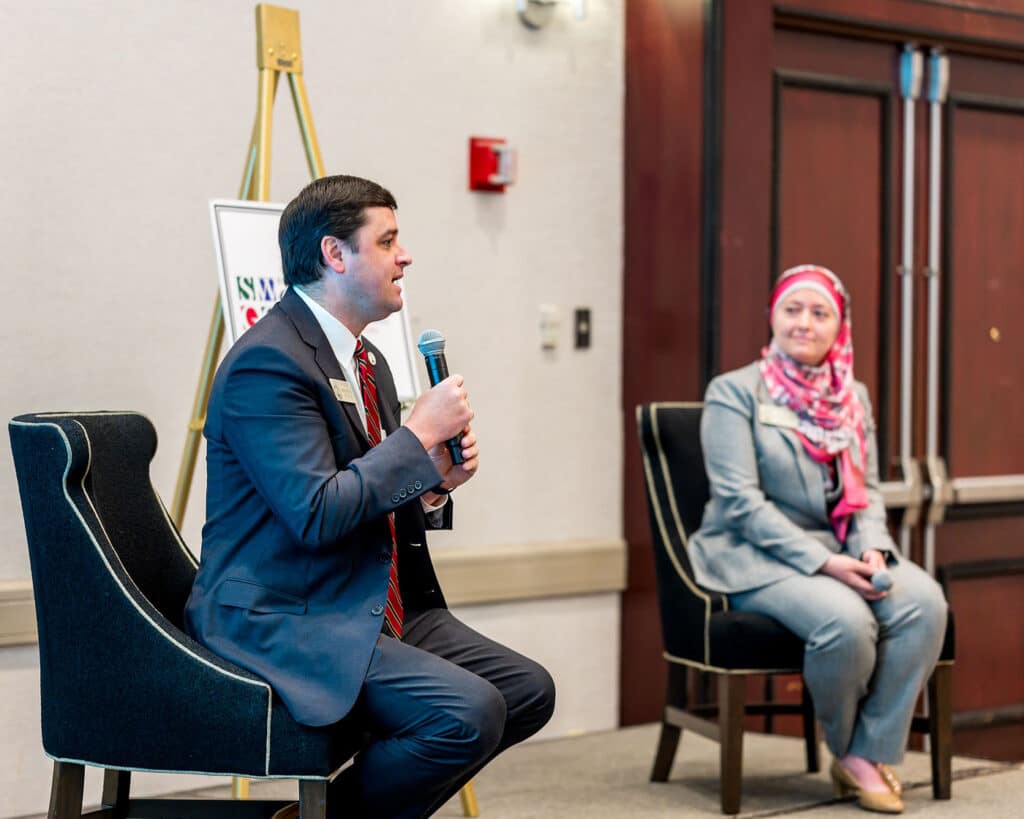
“The problem with this bill is that of the 30 crimes that are listed as now requiring a cash bail, the majority of them don’t actually require jail time, even if you’re found guilty of them. So now, somebody who would not even have ever served time for those crimes that are listed could now serve jail time because they cannot afford their bail,” she explained.
She added that the law doesn’t address the crimes it’s supposed to protect citizens from.
“We see these headlines, but this bill doesn’t address those because what we see happening is that a lot of churches now will no longer be able to bail people out that cannot afford their bail because of this bill,” she said.
“And churches that have been trying to, for example, reunite a parent with their children for Christmas, or whatever the case may be, can no longer do that. There is actually an exception written into this bill for bail bondsmen. So, it’s not like being able to pay cash bail is completely out of the question. It just means that somebody can make money off of it now,” Romman continued.
Hilton said the state isn’t done with addressing public safety issues as they come up.
“I know that’s been a priority of the governor, and I think rightfully so; you know, there’s a reason we’ve got citizens flocking to Georgia over the last ten years; we’ve added a million Georgians to our state, and they are leaving states with policies that don’t have this. They’re coming to Georgia for economic prosperity, for safety and for good schools,” said Hilton.
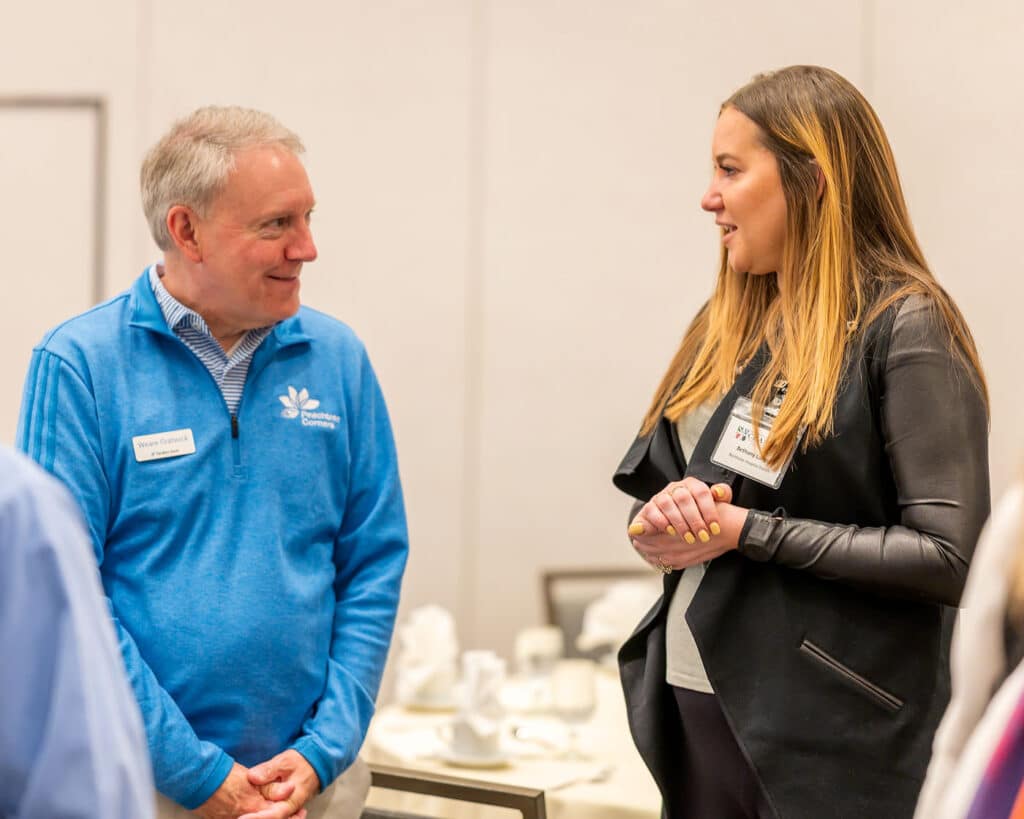
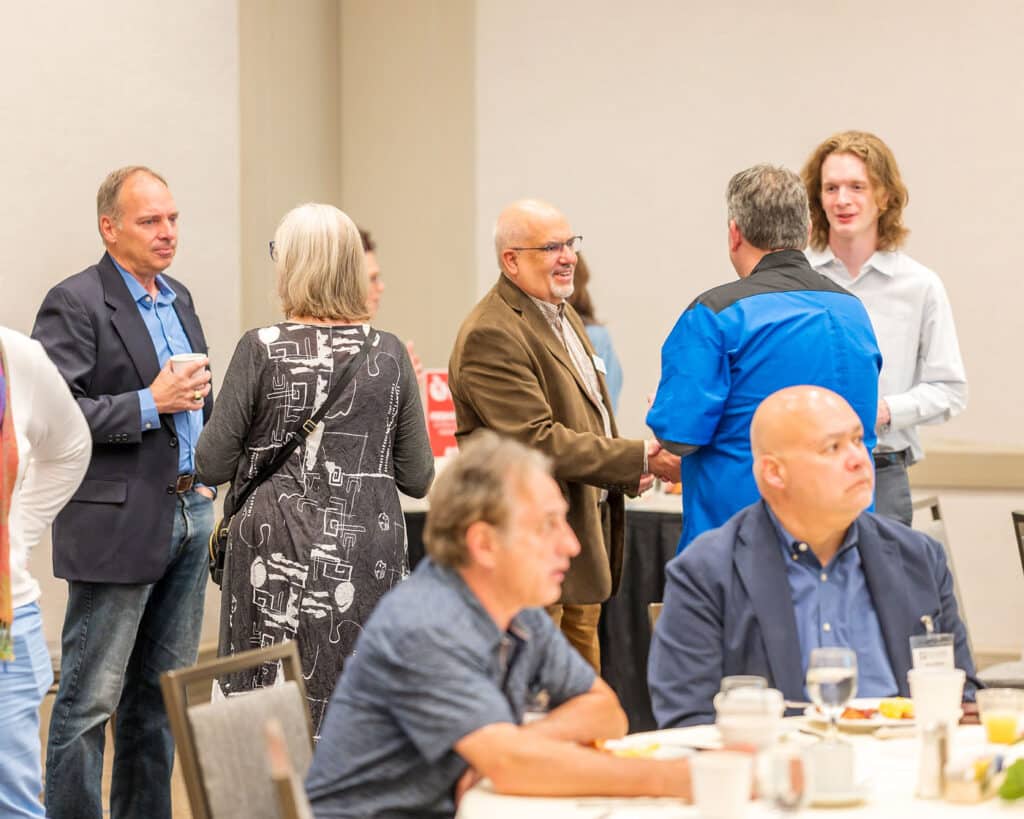
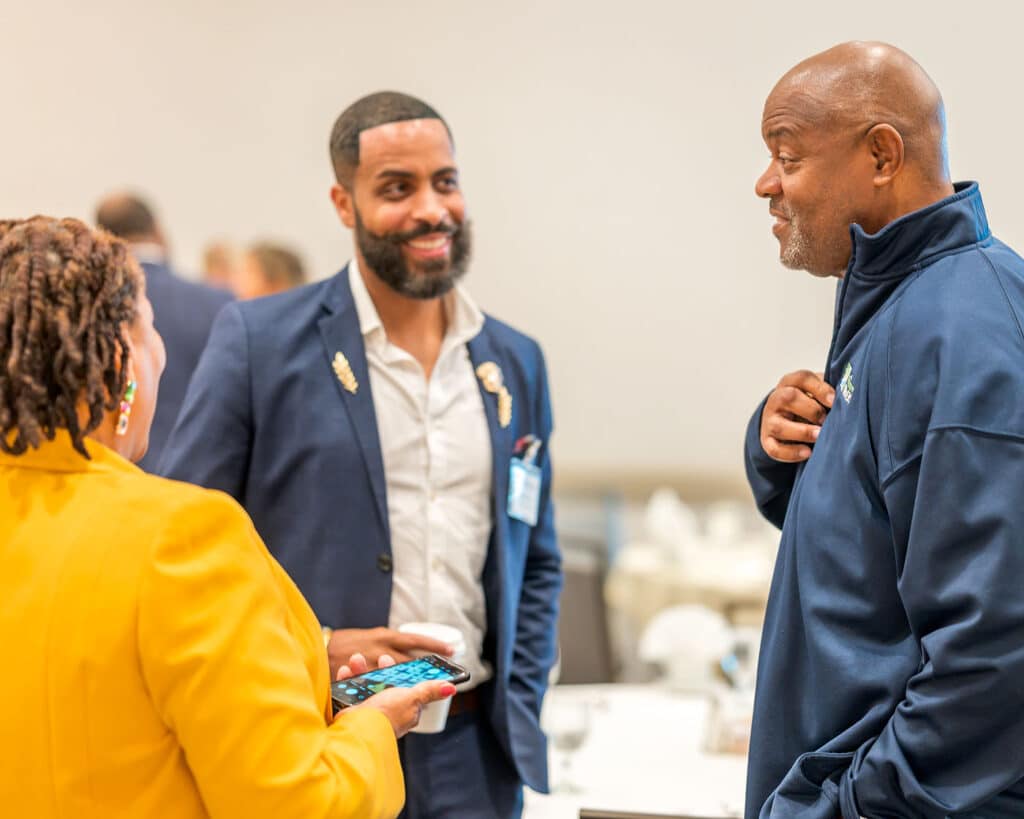
House Bill 1105
Another controversial bill, HB 1105, is framed as a public safety bill that requires local enforcement to coordinate with federal immigration officials when someone in custody is suspected of being in the country illegally.
Some say it’s an immigration bill.
“I know that the federal administration is trying to tell us there’s not a crisis. But there is a humanitarian crisis going on right now on our southern border. … But they’re not handling it the right way, and it’s starting to impact our communities,” said Hilton.
“We’ve got sheriffs who have folks in their custody, who [need] to be reported up to ICE. And essentially, they’re sort of ignoring what’s in the law right now that says you got to report these folks,” he explained.
Romman doesn’t see it that way.
“Again, when you read the contents of the bill, that is, unfortunately, not what it does,” she said. “I’m one of the few, if not the only, member of the legislature that’s done any border project work,” she remarked.
She talked about her work keeping unaccompanied immigrant minors safe.
“I want to remind people that when we talk about immigration, there’s an entire spectrum of people that we are talking about. And it’s not just at the border, it’s also people that fly into our country legally, that gets narrowed into a terrible immigration system,” Romman said.
“It forces our state and county and city police to do federal-level work without more funding. What we’re doing is we’re actually adding an increased burden, essentially onto their workload that we are not paying for. And in addition, within this bill, if they do not do this, they could lose more funding.”
She added that this will take the police away from focusing on local issues and trying to work with people who live in their communities.
“If a community member feels like if they reach out to police for help, and the police are going to deport them, they are less likely to report crimes and less likely to work with our local police department,” Romman said. “If we’re serious about immigration and its relationship to crime, immigrants are 30% less likely to commit crimes, and I don’t want to vilify an entire group of people.”
Romman said she supports a holistic, three-pronged approach that includes improving conditions on the border and pathways to citizenship.
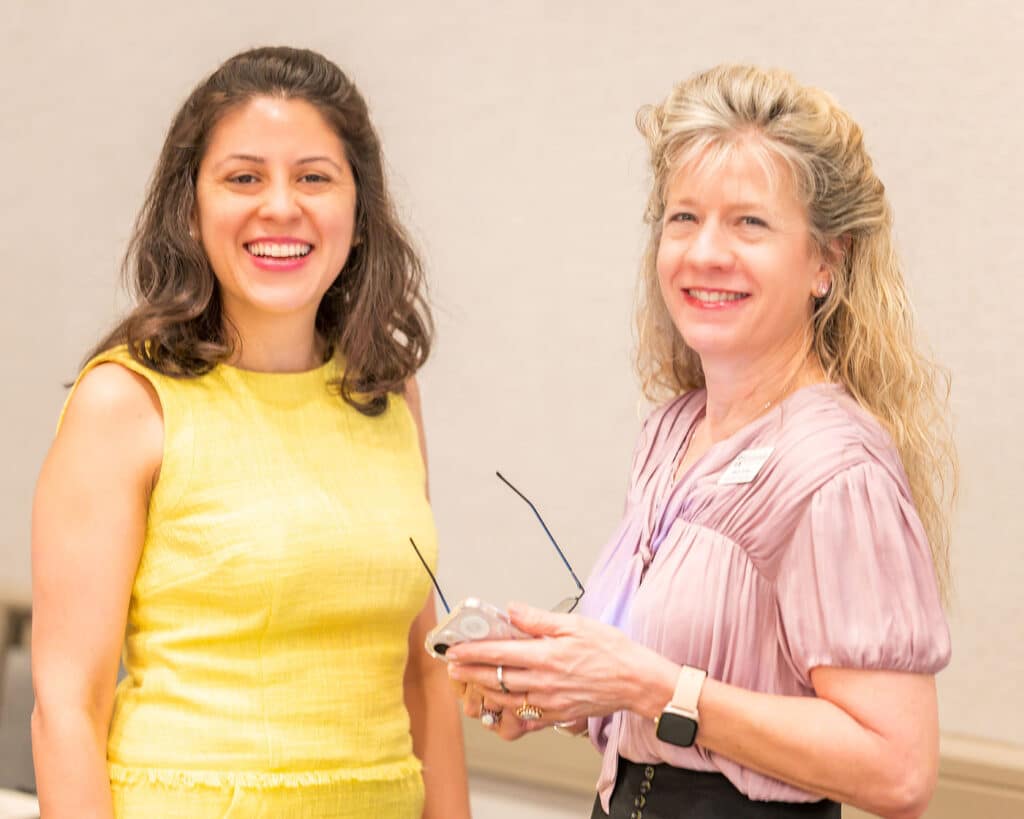
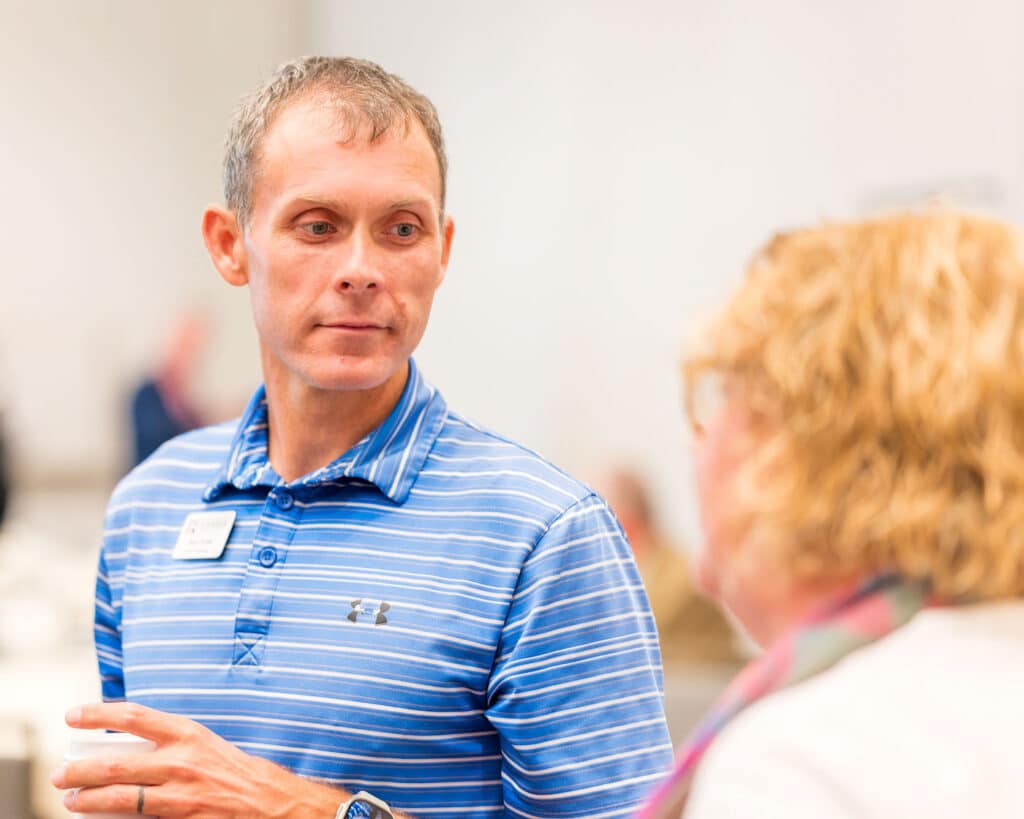

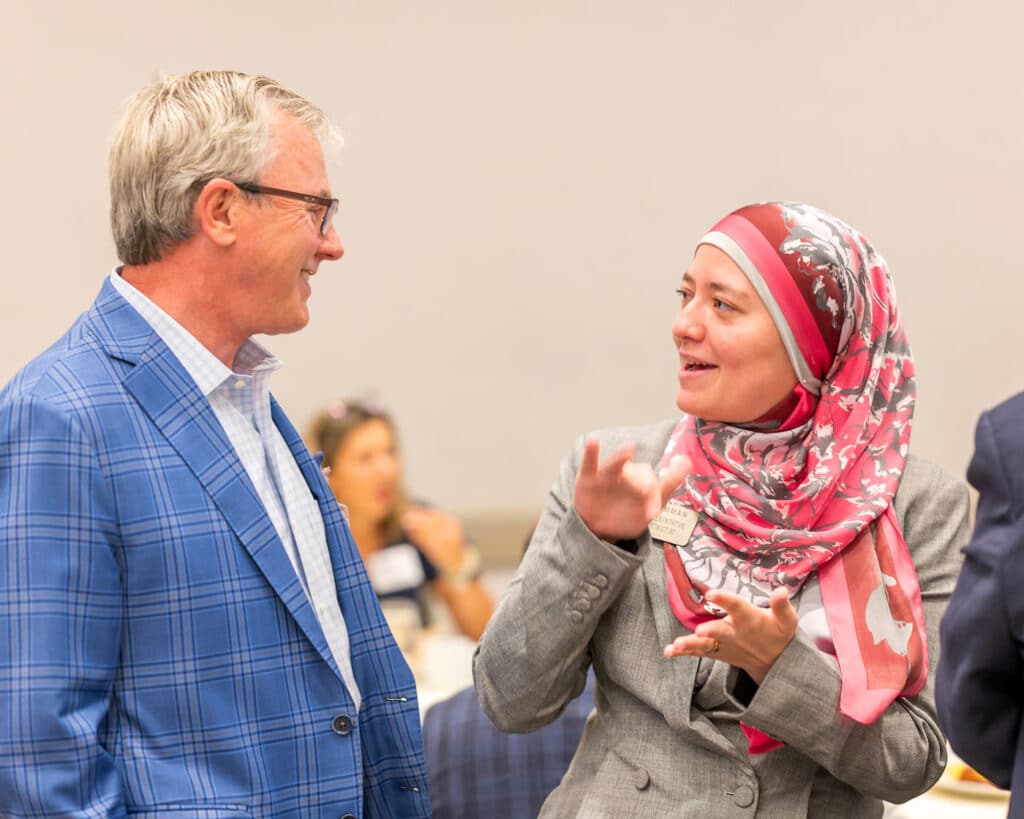
Business-related legislation
When the smoke cleared, both Hilton and Romman joked that they had different opinions about many issues but agreed that’s a healthy part of how the government works.
“The fact that we do disagree and the fact that you, the community, have varying choices and options out there. I think it’s a healthy part of the process,” said Hilton. “And we do have fun. I was telling somebody we play kickball about halfway through the session, and we do get along.”
The discussion moved on to topics such as the FTC ruling on non-compete clauses and tort reform, which just about everyone in the room agreed upon. Although employees could see the beauty of disallowing non-compete clauses, as business owners, they’d hate to see trade secrets put in jeopardy or valuable time and money put into training to benefit another company.
And everyone wanted to see caps on personal injury claims for things like slip-and-falls and fleet vehicle accidents.
“One of the few regrets I have coming out of session is that we didn’t do more on tort reform,” said Hilton. “Right now, Georgia is the number one judicial hellhole in the nation, meaning that we have more lawsuits on businesses and payouts than anywhere else in the country.”
This was one area where both representatives had similar views.
“I don’t think this is a left or right issue,” said Romman. “I want to make sure that whatever tort reform we pursue does not let, for example, a bad-acting company off the hook. But on the flip side, if somebody is just going around and suing everybody all the time to try and make some money off of it, how do you protect corporations and businesses from those kinds of bad incidents litigation?”
“What I will continue to look for when it comes to tort reform is, how are we going about balancing that?” she added.
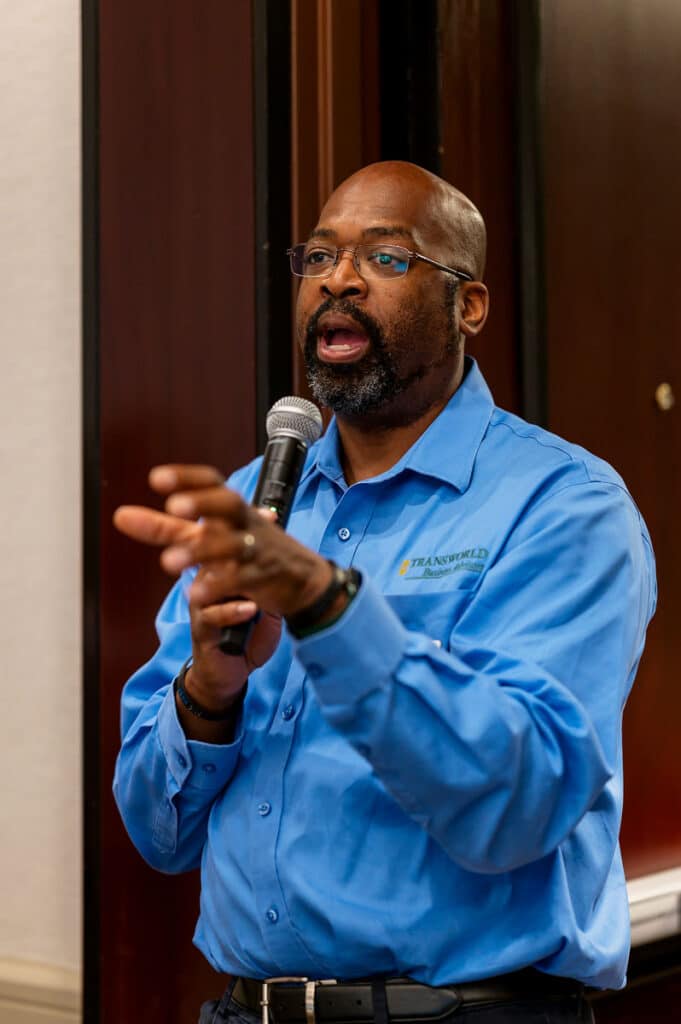
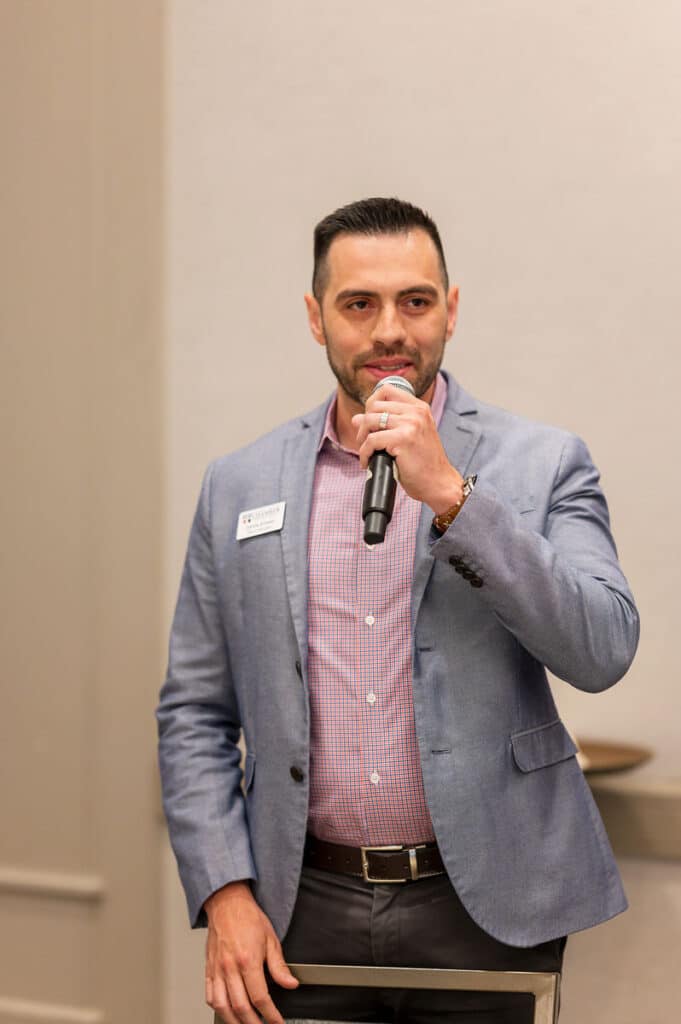
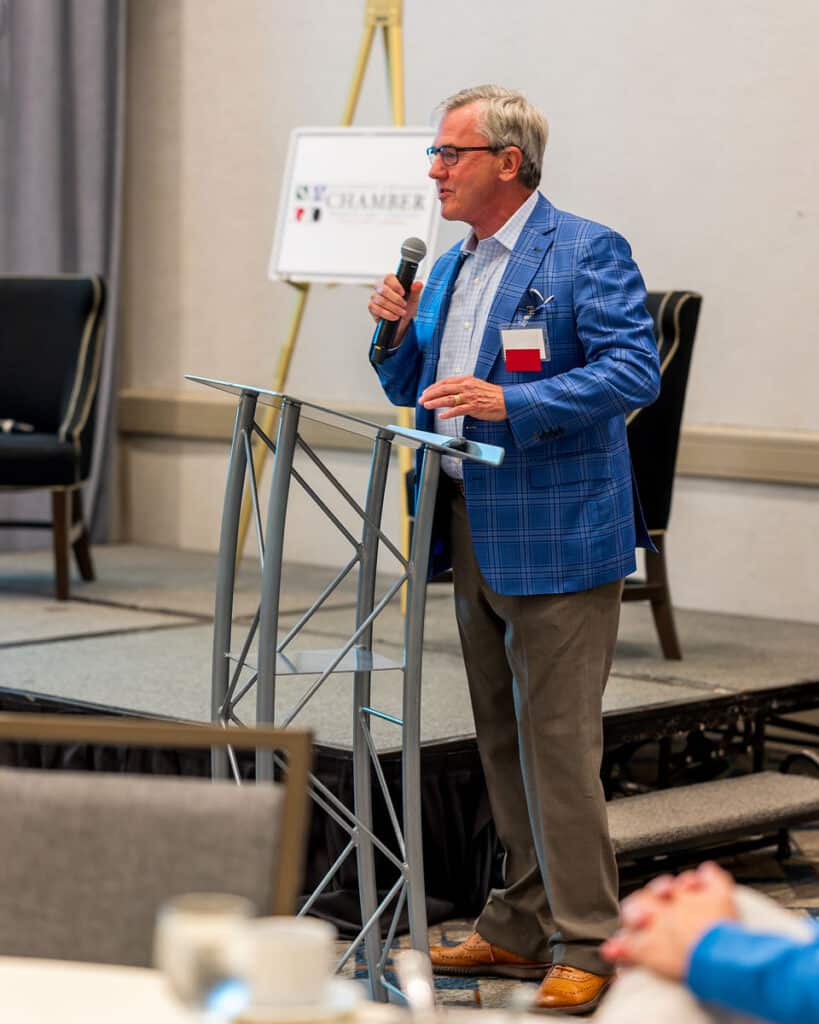
Looking ahead
As the session wrapped, Romman and Hilton pointed out legislation they’d like to see move forward next year.
“House Bill 971 creates a $300 tax credit for taxpayers who sign up for firearm safety training or purchase a safe storage device. It’s a bipartisan measure, viewed by some as a small but perhaps significant move for gun safety advocates, which was tabled in the Senate room,” said Romman.
She said the bill wouldn’t even require someone to disclose that they owned a firearm, but it was meant to incentivize people to store their firearms properly.
“There wasn’t a lot of appetite if somebody didn’t properly store their gun to have consequences for that, so we thought it would just incentivize better behavior,” she said.
Hilton mentioned school safety.
“Over the last three years, every single school in Georgia has gotten a one-time $100,000 grant for School Safety. That’s every school in Georgia; in this most recent budget, we included $45,000 in recurring money for every school in the state to do whatever they want to ensure their campuses are safe,” he said. This includes private schools as well.
At the end of the event, Hilton and Romman reminded the audience that they weren’t running against each other, and even though their views were different, their goals for a better Georgia were equally as passionate.
Related
Read the Digital Edition
Subscribe
Keep Up With Peachtree Corners News
Join our mailing list to receive the latest news and updates from our team.
You have Successfully Subscribed!

What’s going on at Jones Bridge Park and the Challenges of Urban Development

Taste of Peachtree Corners: PCBA Showcases Local Restaurants

The Forum Gives Sneak Peek of New Eateries and Community Spaces

Southwest Gwinnett Mayors Share Visions for the Future

8 Events Happening In and Around Peachtree Corners This August

Peachtree Corners Shines Bright with Light Up the Corners Glow Race this August

Peachtree Corners Shines Bright with Light Up the Corners Glow Race this August

The Forum Gives Sneak Peek of New Eateries and Community Spaces

8 Events Happening In and Around Peachtree Corners This August

Southwest Gwinnett Mayors Share Visions for the Future

Taste of Peachtree Corners: PCBA Showcases Local Restaurants

What’s going on at Jones Bridge Park and the Challenges of Urban Development

Local Resident Opens AtWork Location in Peachtree Corners

CHRIS 180 Expands its Services into Gwinnett County [Podcast]

Light up the Corners [Video]

Capitalist Sage: Business Leadership in Your Community [Podcast]

Cliff Bramble: A Culinary Adventure through Italy

Top 10 Brunch Places in Gwinnett County

A Hunger for Hospitality

THE CORNERS EPISODE 3 – BLAXICAN PART 1

Top 10 Indoor Things To Do This Winter

The ED Hour: What it takes to Remove Barriers from Education
Peachtree Corners Life
Topics and Categories
Trending
-
Business1 week ago
Taste of Peachtree Corners: PCBA Showcases Local Restaurants
-
Business2 days ago
The Forum Gives Sneak Peek of New Eateries and Community Spaces
-
City Government4 days ago
Southwest Gwinnett Mayors Share Visions for the Future
-
Around Atlanta4 days ago
8 Events Happening In and Around Peachtree Corners This August


